Report
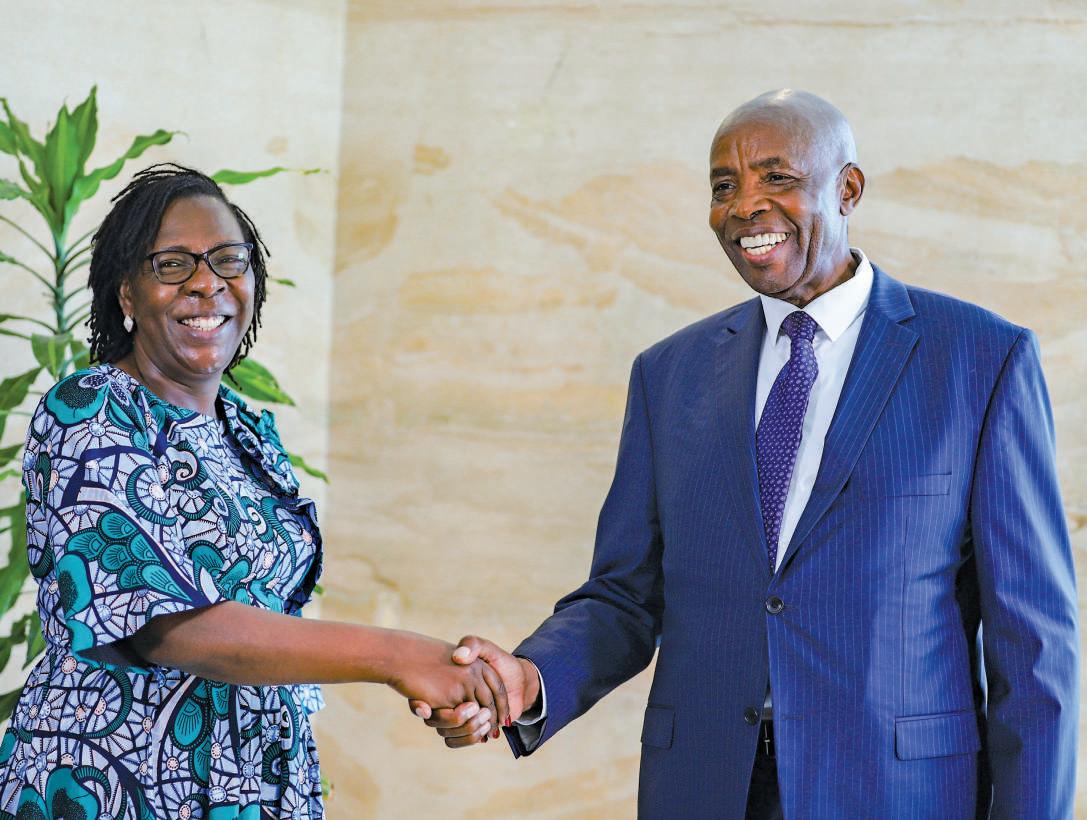
20 23
F A W E FAWE Forum for African Women Educationalists Forum des éducatrices africaines Annual
ADVANCING QUALITY EDUCATION FOR GIRLS AND WOMEN IN AFRICA
The Forum for African Women Educationalists (FAWE) is a membership-based pan-African Non-Governmental Organization that operates through 34 National Chapters in sub-Saharan Africa to promote girls’ and women’s education. FAWE’s vision, mission, and goal are all resolute on the well-being of girls’ education. FAWE’s Regional Secretariat is based in Nairobi, Kenya.
FAWE National Chapters: Benin, Burkina Faso, Burundi, Cameroon, Chad, Comoros, Congo, Ethiopia, Gabon, Ghana, Guinea, Kenya, Liberia, Madagascar, Malawi, Mali, Mozambique, Namibia, Nigeria, Democratic Republic of Congo, Rwanda, Senegal, Seychelles, Sierra Leone, Somalia, South Sudan, Swaziland, Tanzania, The Gambia, Togo, Uganda, Zambia, Zanzibar, and Zimbabwe.

COPYRIGHT:
This publication must not be reproduced for any purposes without prior written permission from FAWE. FAWE cannot be held responsible for any inaccuracies. Parts of this publication may be copied for use in research, advocacy, and education, provided that the source is acknowledged.
©FAWE Forum for African Women Educationalists (FAWE).
Cover photo: Martha Muhwezi, FAWE Africa Executive Director (left) shakes hands with Hon. Ezekiel Machogu, the Cabinet Secretary for Education, Kenya, at the 3rd FAWE Triennial Conference on Girls Education in Africa. Hon. Machogu was the Chief Guest at the conference.
FAWE ANNUAL REPORT 2023 2
3 FAWE ANNUAL REPORT 2023 Table of Contents Executive Summary 5 Acknowledgments 6 Preamble 7 Acronyms 8 1. Equipping the girls and women of Africa for 30 years with skills to thrive! 10 1.1 Comprehensive Scholarships 11 Over 200 scholars graduate under the FAWE/Mastercard Foundation Scholars Programme 11 1.2 Higher Education Access Programme (HEAP) Uganda 13 Higher Education Access Certificate (HEAC) Uganda 13 Scholars and Alumni entrepreneurship 14 Mastercard Foundation Phase II 14 Commonwealth scholarships 14 FAWE African Girls Education Fund (AGEF) Scholarships 14 From school dropout to scholarly success: Vestine’s Inspiring Journey to Graduation 14 2. Advocacy for a transformed Africa! 16 Regional Advocacy 17 FAWE granted Observer status to the Committee of Experts on the Rights and Welfare of the Child 17 CSO Forum engagements 18 Girls and Women Education Cluster under CESA 18 African Union CIEFFA and FAWE Open Meeting to Discuss the Revamp of the CESA Cluster on Girls and Women’s Education. 19 Gender Is My Agenda Campaign (GIMAC) 19 Education at the Centre of the Implementation of AfCFTA 19 National Advocacy 21 Centres of Excellence and Gender Responsive Pedagogy Pre-service Training in Tanzania and Zanzibar 22 Commemoration of International Days 22 Let’s encourage more girls to take up Science while still at school. 23 Empowering African girls and women through gender-responsive programmes 24 Tamatisha! 24 EDUFAM 25 Imarisha Msichana! – (Mastercard Foundation Programme in Kenya) 25 Digitalising training content for Gender Responsive Pedagogy 26 Gender Responsive Pedagogy eLearning Course Launched at FAWE Conference 26 Echidna Giving Phase III 28 Make Way 28 Break Free Alliance 28 Women in Political Participation 30 SHARE 30 UNESCO Spotlight series (FAWE/UNESCO) 30 IFEEFA 30 KIX Karanta 31
FAWE ANNUAL REPORT 2023 4 KIX Centers of Excellence 31 IsDB 31 Wellspring Philanthropic 31 3. It’s all systems go! FAWE’s Institutional Capacity Strengthened 32 Moving and growing together 33 National Chapter Governance Systems 33 Engaging FAWE’s alumni 34 RESOURCING FAWE – INVESTING IN EDUCATION 35 Fostering partnerships – FAWE’s past and current partnerships 37 4. Propelling girls’ education agenda through research and evidence generation 38 2023 Highlights 40 FAWE Hosts the Much-Anticipated 3rd Triennial International Conference on Girls’ Education in Africa 40 FAWE Africa Selects New Board 45 FAWE’s 30th Anniversary Celebration: A Reflection of Impact and Vision 47
Executive Summary
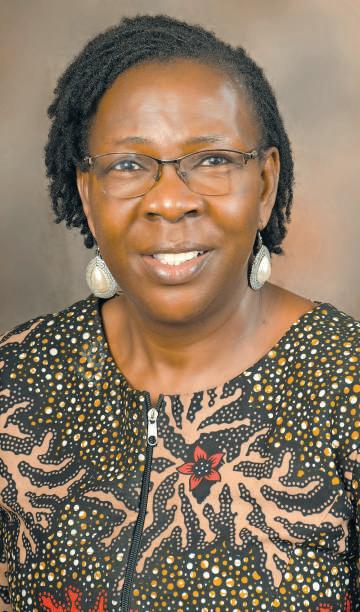
It is with immense pride and gratitude that I present the annual report of the Forum for African Women Educationalists (FAWE). Over the past year, FAWE has continued its unwavering commitment to advancing gender equality in education across the African continent.
Throughout the year, FAWE has remained dedicated to empowering girls and women through innovative programmes, strategic partnerships, and advocacy efforts. Our initiatives have focused on addressing the barriers that prevent girls from accessing quality education, while also equipping them with the skills and knowledge they need to thrive in today’s world.
One of the highlights of the year has been the opportunity for FAWE to embark on an exciting renewed journey of partnership with the Mastercard Foundation. Over the next seven years, this partnership will empower young women and men in 10 Sub-saharan African countries with education and training opportunities, paving the way for dignified and fulfilling employment.
In addition, FAWE continued to advocate for policy changes and investment in education, including increased funding for girls’ education and the integration of gender-responsive approaches into education systems across the Continent.
In November 2023, FAWE hosted a successful Triennial International Girls’ conference, bringing together stakeholders from across the education sector to discuss innovative solutions for advancing girls’ education in Africa. We also got the opportunity to share highlights of our new strategic plan 2024 – 2028 that embraces strategies to ensure girls and young women thrive in their societies. I extend my sincere gratitude to all who participated in making the conference a resounding success.
FAWE marked her 30th anniversary since her establishment. The celebration was a reflection of30-years journey of enabling girls and women to access education and training opportunities in Africa. We look forward to more years of empowering girls and women across Africa.
I would like to express my deepest appreciation to FAWE dedicated staff, partners, and supporters whose unwavering commitment has been instrumental in driving FAWE’s mission forward. Together, we will continue to work tirelessly to ensure that every girl and woman in Africa has the opportunity to fully utilise their potential through education.
Ms. Martha R.L. Muhwezi Executive Director, FAWE Africa
5 FAWE ANNUAL REPORT 2023
Acknowledgments
The content of FAWE’s 2023 Annual Report is a result of dedication and meticulous program implementation by the Regional Secretariat (RS) under the leadership of Ms. Martha R.L Muhwezi, the Executive Director. We thank the FAWE Africa Board for their unwavering support and strategic guidance throughout the year. We also express our sincere appreciation to each of our 34 National Chapters for their dedicated efforts and enthusiastic contributions towards advancing women and girls’ education in Africa. We acknowledge and thank FAWE members and alumni for their significant contributions and unwavering support in the creation of this report.
FAWE is deeply appreciative of the generous financial support provided by our valued partners, including the Mastercard Foundation, Echidna Giving, the Ministry of Foreign Affairs Netherlands (Dutch Government) through the Make Way consortium and the Break Free Alliance, the Embassy of Sweden in Addis Ababa through International IDEA, the Ford Foundation, the French Embassy in Senegal, the Foundation Paul Gerin-Lajoie (FPGL), the International Development Research Centre (IDRC), UNESCO, Edufam, the Islamic Development Bank (IsDB), the Karanta Foundation, Wellspring Philanthropic Fund, Together for Girls, Global Affairs Canada, and UNICEF.
We extend our heartfelt gratitude to the entire team at the FAWE Regional Secretariat for their diligent implementation of the programs outlined in this report. Special recognition is extended to Teresa Omondi - Adeitan, the Deputy Executive Director and Head of Programmes, for her invaluable guidance and support in implementation of the programme and development of this report. We also extend special thank you to Kossi Tsenou, Senior Communication Officer, Emily Buyaki, Communication Officer, Catherine Asego, Senior Advocacy and Partnerships Officer, and Cynthia Barasa, Programmes Assistant, for their dedicated efforts in producing this report that captures invaluable lessons and addressed critical issues pertaining to the education and empowerment of girls and young women in Africa.
We welcome you to read the report and hope it will give you insights to FAWE’s work and encourage your partnership with us as we begin implementation of our next strategic plan 2024 -2028.
FAWE ANNUAL REPORT 2023 6
Preamble
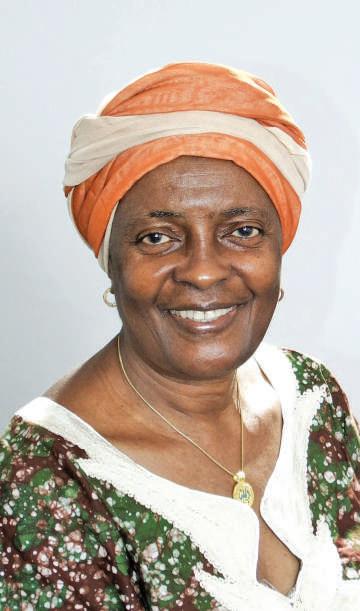
It is with great honor and pleasure that I present the 2023 Annual Report for the Forum for African Women Educationalists (FAWE). As we reflect on the past year, we celebrate the remarkable progress and impactful initiatives that have propelled our mission forward.
FAWE, a beacon of hope and catalyst for change, has for the last 30 years made significant change in advancing education for girls and women, not only in Africa but globally. In November 2023, we celebrated 30years of changing lives, reflecting on our enduring commitment to empowering women and girls through education.
We acknowledge that education is not only a fundamental human right but also a crucial driver of economic and social development. However, women and girls continue to face daunting barriers to accessing education, including poverty, discrimination, and societal norms that prioritize boys’ education.
FAWE Africa remains steadfast in its dedication to dismantling these barriers and creating a world where every woman and girl can access quality education and thrive in an equitable and inclusive society.
This report provides comprehensive description of FAWE’s achievements in 2023. Through our diverse range of programs and initiatives, we have tirelessly worked to empower women and girls, enabling them to unlock their full potential and contribute meaningfully to society.
None of our accomplishments would have been possible without the unwavering dedication, steadfast commitment and tireless efforts of our exceptional staff, volunteers, likeminded and development partners. These contributions have touched countless lives and have paved the way for a brighter future.
We continue to contribute in building an Africa where every woman and girl can access education and unlock their boundless potential. It is my sincere hope that this report serves as a source of inspiration and motivates you to join us in our noble course. Together, let us embark on this transformative journey and shape a future where dreams know no boundaries.
Hon. Aïcha Bah Diallo Board Chairperson, FAWE
Africa
7 FAWE ANNUAL REPORT 2023
Acronyms
ACERWC African Committee of Experts on the Rights and Welfare of the Child
ACHPR African Commission on Human and People’s Rights
AfCFTA African Continental Free Trade Area
AGEF African Girls Education Fund
AU African Union
AUC African Union Commission
AU/CIEFFA African Union International Centre for the Education of Girls and Women in Africa
AULO African Union Liaison Office
BF! Break Free!
CAPE Climate Action for Partnership in Education
CEO Chief Executive Officer
CESA Continental Education Strategy for Africa (CESA 16-25)
COE Center of Excellence
COCAFEM The Concertation of Collectives of Women’s Associations
CPD Continuous Professional Development
CSE Comprehensive Sexuality Education
CSO Civil Society Organization
ECE Early Childhood Education
ED Executive Director
EDC Enrollment Drive Campaign
EiEWG Education in Emergency Technical Working Group
ESA Eastern and Southern Africa
ENAI Ewang’an Nadede Advocacy Initiatives
ESARO East and Southern Africa
FAWE Forum for African Women Educationalists
FAWEK FAWE Kenya
FAWETZ FAWE Tanzania
FAWEMA FAWE Malawi
FAWEZA FAWE Zambia
FAWENA FAWE Namibia
FeMNet 4
GTE Feminist Network on Gender
Transformative Education
FGM Female Genital Mutilation
GES4CESA Gender Equality Strategy for the Continental Education Strategy for Africa
GCI Girls at the Center Initiative
GIMAC Gender is my Agenda Campaign
GPE Global Partnership for Education
GRP Gender Responsive Pedagogy
HEAC Higher Education Access Certificate
HEAP Higher Education Access Programme.
HERS-EA Higher Education Resource Services – East Africa
IATI International Aid Transparency Initiative
IDRC International Development Research Center
IIDEA International Institute for Democracy and Electoral Assistance
INES Institut d’Enseignement Superieur
IICBA International Institute for Capacity Building in Africa
IsDB Islamic Development Fund
INGO International Non-Governmental Organizations
KDHS Kenya Demographic and Health Survey
KICD Kenya Institute of Curriculum Development
KIX Knowledge and Innovation Exchange
MEPT Movimento de Educação Para Todos
MOEST Ministry of Education Science and Technology
MoFA Ministry of Foreign Affairs
MTR Mid-term review
NC National Chapter(s)
NCHE National Council for Higher Education
NGO Non-Governmental Organization
OCA Organisation Capacity Assessment
PhD Doctor of Philosophy
RS Regional Secretariat
SADC Southern African Development Community
SAT Southern Africa Trust
SHARE Sexual Health and Reproductive Education
SRGBV School Related Gender Based Violence.
SRHR Sexual Reproductive Health and Rights
SDG Sustainable Development Goals
SPO Strategic Partner Organization
STEM Science Technology Engineering and Mathematics
TVET Technical and Vocational Educational and Training
TOC Theory of Change
TOT Trainer of Trainers
TWG Technical Working Group
UNESCO United Nations Educational, Scientific, and Cultural
UNICEF United Nations Children’s Fund
UR University of Rwanda
WCARO West and Central Africa
USAID
United States Agency for International Development

FAWE ANNUAL REPORT 2023 8
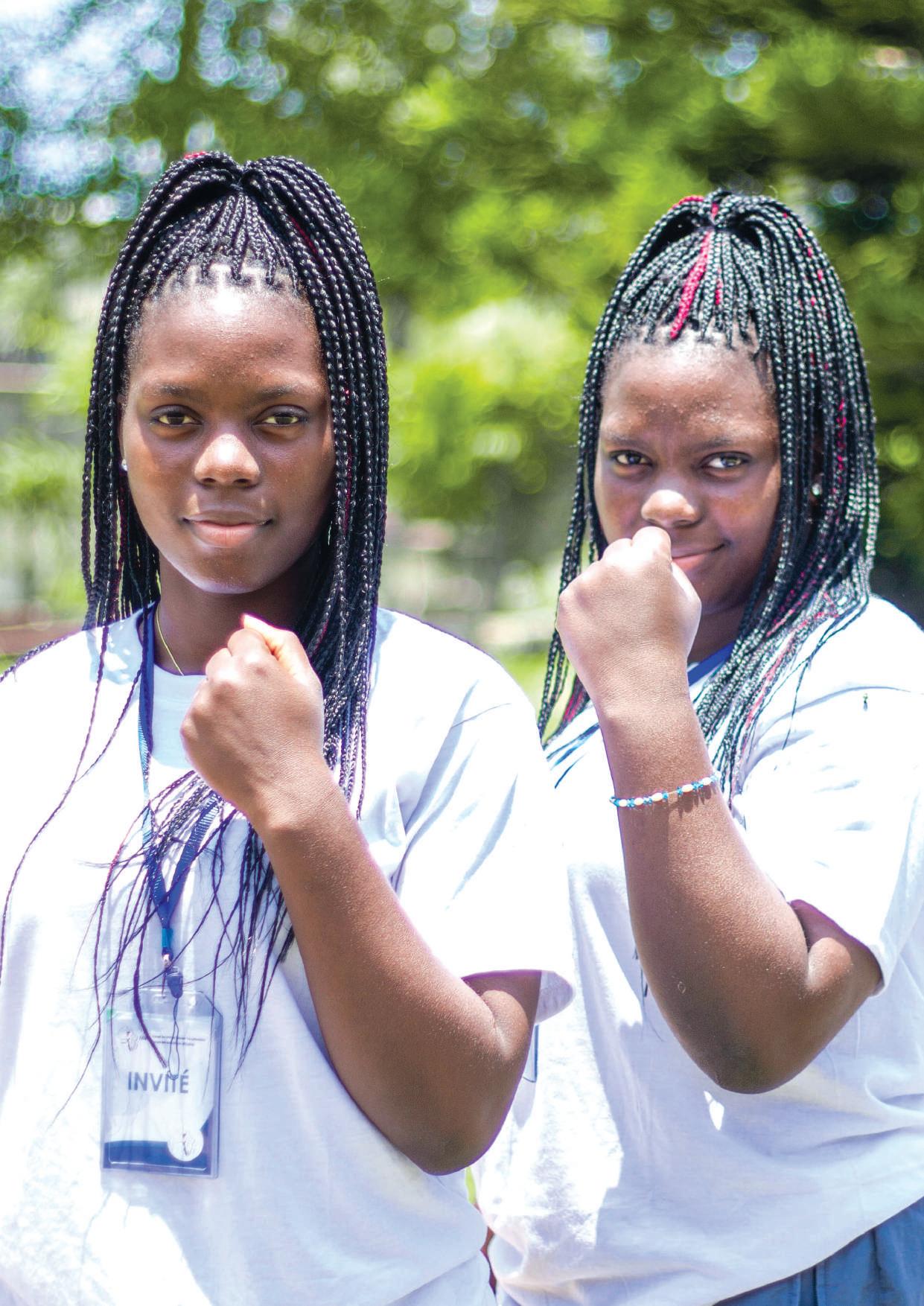
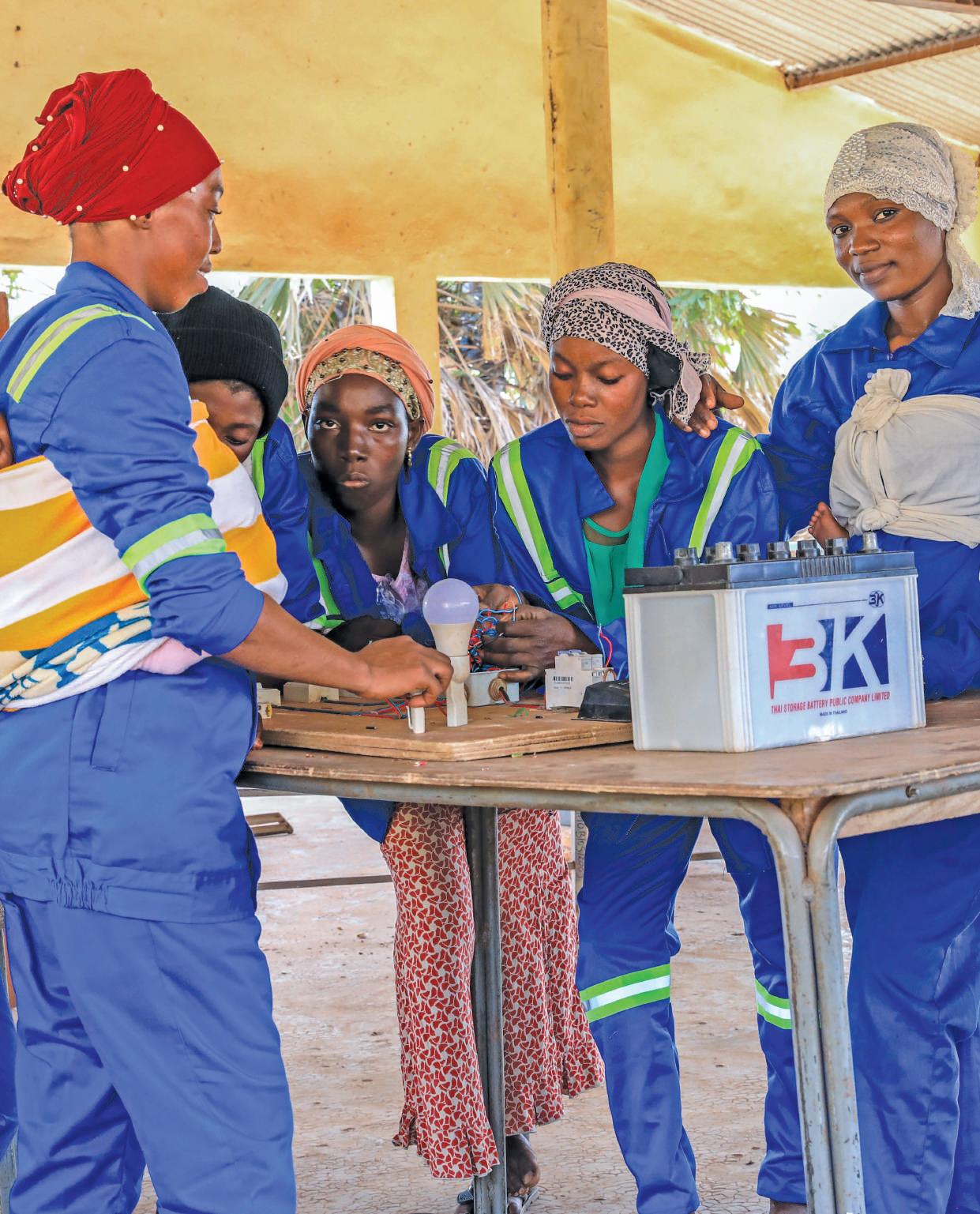
Equipping the girls and women of Africa for 30 years with skills to thrive!
1. Equipping the girls and women of Africa for 30 years with skills to thrive!
It has been 30 years since the wheels of FAWE were set in motion. An educationalist movement that has seen approximately 3 million African girls and women get an education and/or training. An indelible mark that will be felt for generations to come.
At FAWE, we pride ourselves in making an impact in the lives of many families. We believe that when you educate a girl, you educate a nation.
This chapter outlines activities undertaken in 2023 that contribute towards the realisation of FAWE’s strategic objective one.
1.1 Comprehensive Scholarships
The FAWE/Mastercard Foundation Scholars Program1 was scheduled to end in 2023. However, due to Covid 19 interruptions of academic calendars, the program will have its last scholars graduate in 2025 specially medicine and architecture students. This however did not stop a new partnership with the Foundation to start, the Phase II of the programme to support young people’s education in tertiary school. (Read details of phase II in page).
In 2023, FAWE Rwanda had a total of 385 scholars out of which 275 graduated leaving 85 expected to graduate in 2024 and 25 in 2025.
FAWE Ethiopia did not have active scholars as the last cohort graduated in July 2022. The chapter however supported 30 Alumni on entrepreneurship and initiated the end-of-project reflection that will advise implementation in the next phase of support
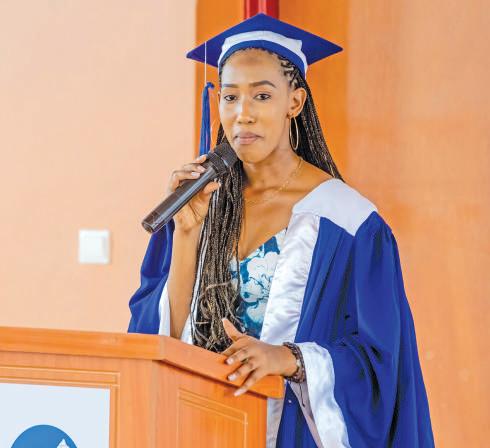
Over 200 scholars graduate under the FAWE/ Mastercard Foundation Scholars Programme
A total of 275 young women, recipients of scholarships provided by the Forum for African Women Educationalists (FAWE) in collaboration with the Mastercard Foundation, completed their undergraduate studies at INES Ruhengeri and the University of Rwanda (UR) and had a colourful graduation ceremony held on 22nd September 2023
The gathering not only marked their transition into the workforce but also introduced them to potential investors who recognized their exceptional academic achievements.
3 Million 385 30
FAWE has seen approximately 3 million African girls and women get an education and/ or training.
In
by FAWE Ethiopia on entrepreneurship
11 FAWE ANNUAL REPORT 2023
FAWE/Mastercard Foundation program begun in 2013, as a 10 year programme implemented in Rwanda and Ethiopia to support 2000 scholars through secondary school and later university. FAWE Rwanda supported 1200 girls only and Ethiopia supported 600 girls and 200 boys.
1
A scholar at a past graduation ceremony in Rwanda. Alumni supported
2023, FAWE Rwanda had a total of 385 scholars out of which 275 graduated leaving 85 expected to graduate in 2024 and 25 in 2025.
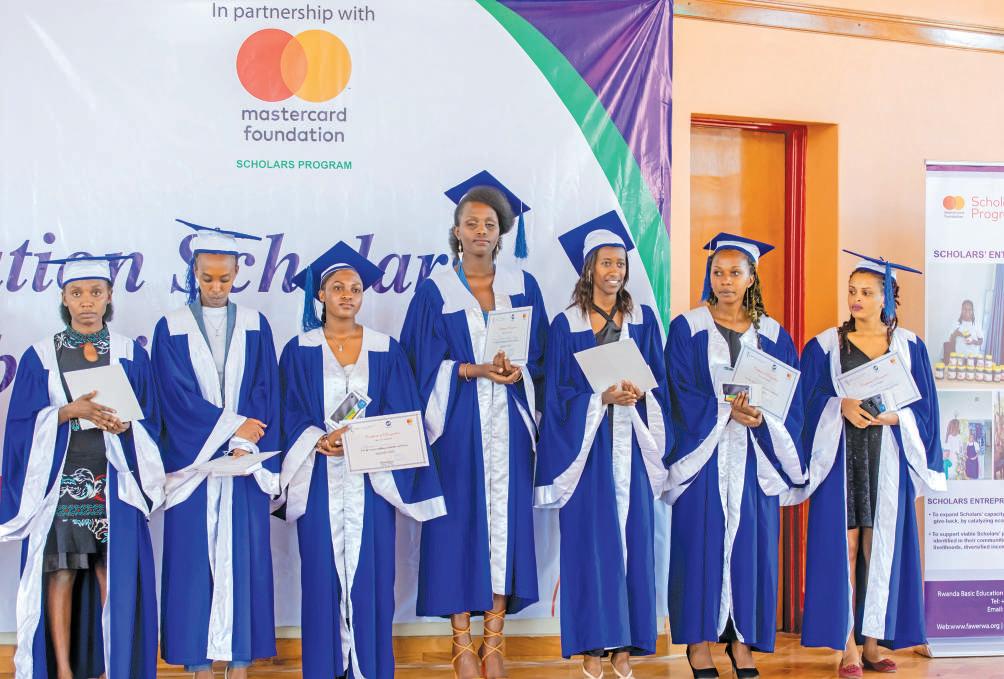
This is the third cohort of young women who have benefitted from continuous capacity development and skill enhancement under the scholarship program. These graduates, acquired bachelor’s degrees across various fields such as Engineering, Computer Science, Economics, Biomedical Laboratory Sciences, law, Nursing and Education
While addressing potential employers, Ms. Antonia Mutoro, the National Coordinator of FAWE Rwanda, expressed her confidence in the graduates calling upon employers to tap into the talent and expertise that the young women have so as to transform their workplaces. “the young women you see before you are exceptional workers. If you seek to transform your workplaces with excellence and best practices, look no further.” She said.
“the young women you see before you are exceptional workers. If you seek to transform your workplaces with excellence and best practices, look no further.”
Ms. Antonia Mutoro, the National Coordinator of
FAWE Rwanda
Mr. Gatabazi Pascal, the Chief Technical Advisor at the Ministry of Education highlighted that the graduates were not only equipped with knowledge but also empowered to demonstrate their capabilities.
Ms. Martha Muhwezi, the Executive Director of FAWE Africa, commended FAWE Rwanda for their remarkable efforts in expanding access to higher education for women and girls in the Country. She also acknowledged the pivotal role played by the Government of Rwanda through the Ministry of Education in fostering an environment conducive to the organisations success. She extended her gratitude for the continuous and unwavering support that has enabled FAWE Rwanda to make significant contributions to the cause of female education.
Several of these graduates, who
FAWE ANNUAL REPORT 2023 12
FAWE/Mastercard Foundation scholars at the celebration of their graduation day in Kigali, Rwanda in 2023.
completed their studies in 2023, expressed their gratitude toward FAWE and the Mastercard Foundation for providing them with the opportunity to pursue their dreams, acquire valuable skills, and contribute not only to Rwanda’s development but also to the global community.
FAWE Scholarship Program - Milestone
Out of the total 1200 supported by FAWE Rwanda, 838 scholars successfully graduated in various disciplines from UR and INES Ruhengeri. Over 432 of these graduates secured employment, while others pursued further studies in Rwanda and abroad.
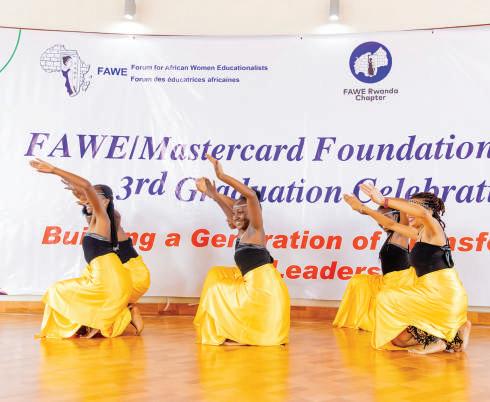
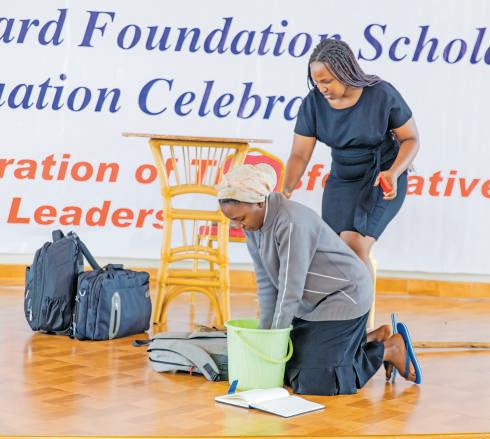
Graduates entertaining guests at the FAWE/Mastercard Foundation Scholars graduation event on 22nd September 2023.
1.2 Higher Education Access Programme (HEAP) Uganda
In partnership with the Mastercard Foundation, FAWE implements the Higher Education Access Program (HEAP) that seeks to enable 300 young women and men from economically disadvantaged regions of Uganda access to education and leadership development, including transition to higher education or to secure employment in sectors that contribute to the development of their communities and the country.
FAWE surpassed the target and a total 334 students (128 Male and 206 female) were registered under the programme. In 2023, 77 (57 females, 20males) graduated. Out of the 77 HEAP graduates, 22 transitioned to work and 3 for post graduate studies. The programme is still ongoing to 2024.
Higher Education Access Certificate (HEAC) Uganda
This is a bridging program that was designed by FAWE Uganda in collaboration with partner universities including Gulu University, Mbarara University of Science and Technology, and Busitema University. The goal of this program was to give a second chance opportunity to students from marginalized districts who missed to join desired STEM courses at University by small margins. This can be due to limited access to laboratory facilities and other learning materials and inadequate STEM subject teachers in marginalised and hard to reach areas. The bridging program was approved in 2019 and accredited by the National Council for Higher Education (NCHE) as the 4th pathway to join university in addition to direct, mature entry and diploma entry scheme.
The Milestone:
By 2023, the HEAC universities have grown from three to seven accredited institutions and the number of students that have gone through the program is now over 1,800 from the initial 60 students. These are young people who have gotten a second chance opportunity to access university programs through diploma and degree programs. . Four others (Uganda Christian University, Makerere University, Bishop Start University and Uganda Martyrs University) are in the process of developing their curriculums for accreditation. in 2024. Bugema University, Kisubi University, Nkumba
13 FAWE ANNUAL REPORT 2023 13
2 Busitema, Mbarara University of Science and Technology, Gulu, Kabale, MUNI, Lira and Mountain of the Moon
University and Mutesa Royal 1 University have initiated the process of accreditation. FAWE envisions a total of an additional 15 universities that will be accredited by 2024.
Scholars and Alumni entrepreneurship
FAWE in partnership with the Mastercard Foundation supported scholars to excel in their entrepreneurship ventures in Rwanda and Ethiopia. In Rwanda, a total of 180 alumni were supported with training and grants to start businesses.
In Ethiopia 30 alumni received entrepreneurship funds to establish a businesses. Overall, entrepreneurship is serving as a key pathway for transition to work for FAWE graduates.
Commonwealth scholarships
FAWE nominated 52 female candidates from 10 countries for consideration for the 2023/2024 academic year. 16 were selected. Nominations for 2024/2025 academic year concluded with FAWE submitting 52 nominees (27 Master’s and 25 PhD).
FAWE African Girls Education Fund (AGEF) Scholarships
FAWE kicked girls scholariship under the AGEF fund piloting in Kenya, Togo, Eswatini, Liberia and Burundi. AGEF is a homegrown fund which FAWE uses to supplement the other scholarships that she implements.
From school dropout to scholarly success: Vestine’s Inspiring Journey to Graduation
I was born in a humble family in rural Rutsiro district in Western Province of Rwanda in May 1991. My twin brother Gato Joseph and I are the thirdborn children among six siblings. My parents are subsistence farmers who did not believe in the education of a girl child beyond primary school. My brother and I started primary school in 1997 at Murunda Primary School, and I performed very well at school. This was the beginning of my rough and bumpy educational journey.
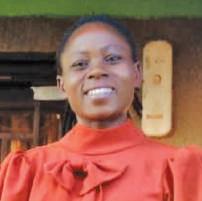
My mother was in favour of my twin brother’s education but not mine. She claimed the family did not have the means to educate me as a girl but preferred to educate my twin brother who had left me in primary school and was in senior two.
A
fresh
start at the age of 20
Despite pressure from my mother to quit school, and with the support of my twin brother who had just finished secondary school, I managed to go back to primary five in 2010 at the age of 20 years. This still upset my parents and I was denied food and scholastic materials as punishment. My brother had to pluck blank pages from exercise books and improvised notebooks for me. Switching from French to English as a language of instruction was another huddle I had to overcome. To the surprise of many who knew what I was going through, I passed the national exams, with a division one grade of 19 points. I had passed very well I could go to a good boarding school but had no support from my parents. With the support of my brother, I could only go to a day school not far from home.
My brother, my only support, had joined university and life was very hard for him too, getting scholastic materials for himself and mine was yet another challenge. I had to forfeit meals, but my resolve to continue with my education was great.
FAWE ANNUAL REPORT 2023 14
A ray of hope
The scholarship by FAWE and the Mastercard Foundation came at a time when I had no hope of continuing my education. I applied for sponsorship when I had just finished senior 3 and with my good marks and life history, I was posted to FAWE Girls school in Gahini, one of the Centers of Excellence where I pursued Mathematics, Economics, and Computers. The scholarship did not only ease the burden of school fees and scholastic materials but also provided mentorship, career guidance and counselling.
Today, I am a graduate with a Bachelor’s Degree in Applied Economics. I have no doubt that with my university education, I will achieve my goals and play an active role in our country’s development. While giving back to the community, I will encourage other girls who have gone through similar situations as mine, suffering from cultural stereotypes, to stand up and not give up but look ahead. FAWE/Mastercard Foundation scholarship has brightened my life, helping me to achieve my educational goal. I am who I am because FAWE Rwanda recognizes the value of the girl child. May God bless all their plans.
No development is possible if some members of society are left behind. In fact, those in society who are ignored continue to consume without producing and later become a burden, yet they too could contribute to income generation. The power of women is unquestionable, women can serve the community in the same way as men because women have the same capabilities. It is important to accord all children equal rights and let them achieve their potential.
As a scholar, I have developed a culture of saving. I plan to open a small business for myself and contribute to my community by helping girls who have dropped out of school and encouraging them to rebuild their lives. I am forever grateful to FAWE for their support to girls for development.
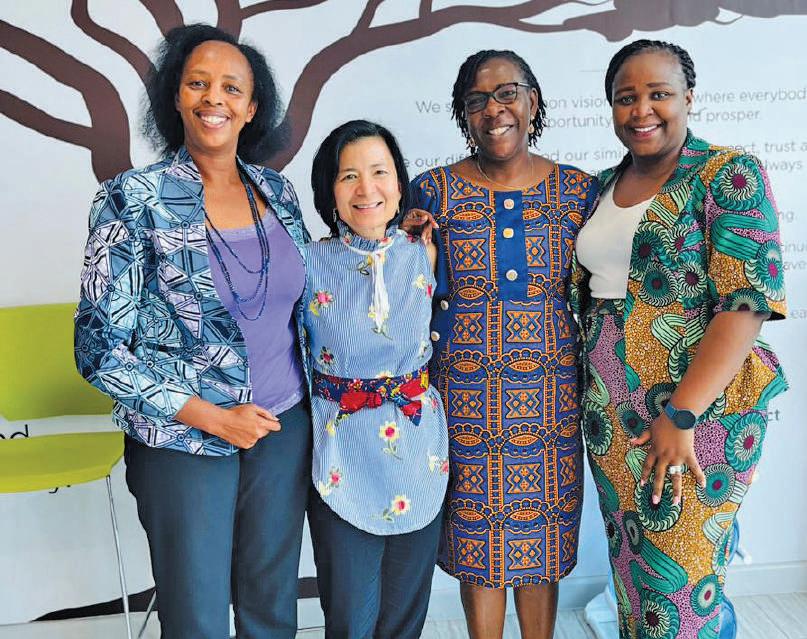
(From left) Ms. Antonia Mutoro (FAWE Rwanda), Dr. Reeta Roy (Mastercard Foundation CEO), Ms. Martha Muhwezi (FAWE Africa Executive Director), and Ms. Teresa Omondi-Adeitan (FAWE Deputy Executive Director & Head of Programmes) during a visit to the Mastercard Foundation offices in Kigali, Rwanda.
15 FAWE ANNUAL REPORT 2023
FAWE’s Senior Advocacy and Partnerships Officer Catherine Asego represents FAWE at the FemNet 4 GTE Network on Gender Transformative Education in Istanbul, Turkey, November 2023.
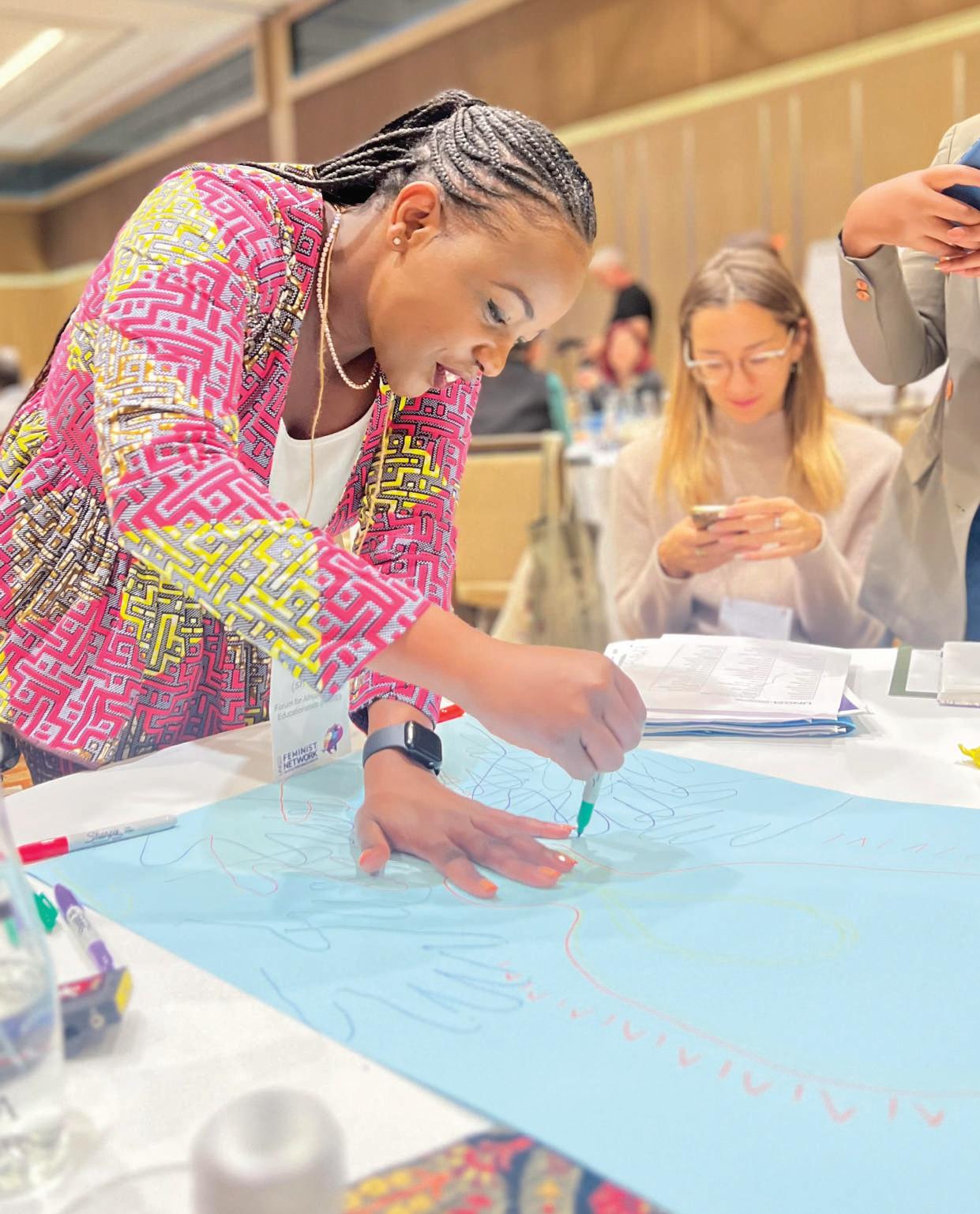
Advocacy for a transformed Africa!
Regional Advocacy
FAWE continues to champion the education and wellbeing of women and girls through various platforms at the Global, Regional, and National levels.
At the Global level, FAWE consolidated its push on the education and well being of women and girls at the pre-consultative technical experts working session on the Commission of Status Women convened by the UN Women in November 2023. Additionally, as a member of the Feminist Network for Gender Transformative Education, FAWE joined feminist champions at a global convening on Gender Transformative Education where we shared our advocacy plans for 2024, on the African Union year of education.
FAWE joined the Global Alliance on Literacy (GAL), as an associate member. An application was also made to the AFDB CSO Committee for consideration as the gender and education thematic lead. FAWE also joined the Girls Not Brides Global Advocacy Group and participated at the ANCEFA policy forum with National education coalitions to share insights into the regional and global advocacy spaces for engagement.
FAWE granted Observer status to the Committee of Experts on the Rights and Welfare of the Child
The African Committee of Experts on the Rights and Welfare of the Child (ACERWC) granted FAWE’s request to be a civil society observer for the committee status by the ACERWC,. This status provides FAWE an opportunity to influence the policies and practices of AU member states and champion gender-responsive programs and interventions. The ACERWC Special Rapporteur on Children in Armed Conflict joined the FAWE webinar as a panelist during the Day of the African Child celebrations held in June 2023.
In October 2023, FAWE joined the Experts working group meeting in Maseru where the ACERWC General Comment on the right to education was written. FAWE presented her findings on the status of retention, access, and transition of girls across countries namely Burkina Faso, Mali, Niger, Cameroun, Kenya, Ethiopia, Mozambique, Zambia and Malawi at the 47th ACERWC ordinary session in Ethiopia in November 2023.
Similarly, FAWE obtained the observer status with the African Commission on Human and Peoples Rights (ACHPR) and the same was granted during the 77th session of the commission Arusha in October 2023.

FAWE’s Senior Advocacy and Partnerships Officer Catherine Asego presenting FAWE’s research work at the ACERWC committee session in Addis Ababa, Ethiopia.
CSO Forum engagements
FAWE supported the CSO forum convening in March 2023 in Maseru Lesotho from 26th to 27th March 2023 and made a presentation on the impact of the Committee’s decision on the ban of re-entry of pregnant girls relying on the FAWE studies on teenage pregnancies in different countries in Africa. The outcome statement of the CSO Forum which was presented to the ACERWC, included the call for a guiding framework for states on school re-entry Outcome Statement CSO Forum Nov 2023.pdf FAWE further supported the convening of the CSO Forum in November session in Addis Ababa Ethiopia from 5-6th of November 2023 and presented on innovative approaches in school re-entry for teenage mothers. The outcome statement presented to the ACERWC on the 7th of November 2023 included FAWE’s recommendation to ACERWC to engage African states to ensure access to formal schooling for pregnant girls and teenage mothers FV - CSO Forum statement to the ACERWC 42nd Session[21] (1) (1).pdf FAWE leveraged the partnership with the CSO Forum and its position as a member of its management committee to obtain its Observer Status and work with the committee on the General Comment on the right to education.
FAWE worked closely to support the participation of FAWE National chapters (Malawi and Zambia), to the SADC Child Rights Conference. During the conference, FAWE was invited to join the African Early Childhood Network Side event as a panelist and presented on the FAWE Tuseme Model as an innovative approach to girls’ retention in school.
17 FAWE ANNUAL REPORT 2023
Girls and Women Education Cluster under CESA
FAWE co-convened the inaugural CESA cluster in Ouagadougou in Burkina Faso from 12th to the 14th of September 2023. During the meeting, the team developed the TORs and joint advocacy calendar for 2024. https://cieffa.au.int/en/news/pressreleases/2023-09-15/au-cieffa-and-fawe-convenemeeting-revamp-cesa-cluster-gwe. FAWE also participated in the Inter-Cluster meetings on the 19th of September and presented on the achievements of the Women and Girls Cluster for the year 2023. https:// au.int/sw/node/43152 .
African Union CIEFFA and FAWE Open Meeting to Discuss the Revamp of the CESA Cluster on Girls and Women’s Education.
African Union Commission (AUC) departments, African Union (AU) organs, United Nations agencies, development partners, and CSOs gathered both in person and online to brainstorm ways to revamp the CESA Cluster on Girls and Women’s Education. The meeting was convened by the African Union International Center for Girls and Women’s Education (African Union CIEFFA) and the Forum for African Women Educationalists (FAWE), co-chairs of the Cluster. The three-day meeting, which was held from September 12 -14, 2023, brought together strategic stakeholders working at the nexus of gender and education under the theme, “Positioning girls and women’s education at the forefront: Curating continental action in line with CESA”.
Leaning on the AU theme of the year for 2024 on education dubbed, “Educate an African fit for the 21st Century: Building resilient education systems for increased access to inclusive, lifelong, quality, and relevant learning in Africa”, the gathering was also a platform for all participants to plan, accelerate, and curate collective action with respect to 2024.
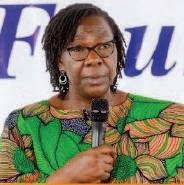
The workshop officially opened on September 12, with Mrs. Simone Yankey calling on all stakeholders to be aware that, “It is imperative that the various custodians of girls’ education on the continent, rally under the umbrella provided by the CESA to further push our agenda.”
Ms. Martha Muhwezi, Executive Director of FAWE and co-convener, was keen to point out that, “this very important gathering gives us an opportunity to address a critical issue that has far-reaching implications for the future of our great continent – the education of women and girls.”
The Norwegian Permanent Mission to the AU, one of the key partners of the AU on education-related issues, renewed its commitment to continuous support. “Norway is committed to the AU through our joint financing agreement in which also AU CIEFFA is funded. We will try our best to follow the developments of the CESA going forward as well as the programs and developments of the AU theme of the year for education”, Ms. Jenny Moller, Counsellor of Education asserted.
Among those present in the hall and online were participants from 19 multi-sectorial organisations.
It must be noted that the CESA cluster on girls and women’s education is one of AU’s 12 clusters and is tasked with providing a platform to advocate for gender-sensitive, inclusive, and transformative education plans, budgets, policies, and practices at continental and national levels.
The African Union CIEFFA also intends to seize this opportunity to rally different actors behind the planning of the African Union CIEFFA 8th High-Level Dialogue on gender equality in education and the 1st Pan African Conference in Girls’ Education in Africa.
“Educate an African fit for the 21st Century: Building resilient education systems for increased access to inclusive, lifelong, quality, and relevant learning in Africa”
Ms. Martha Muhwezi, Executive Director of FAW
FAWE ANNUAL REPORT 2023 18
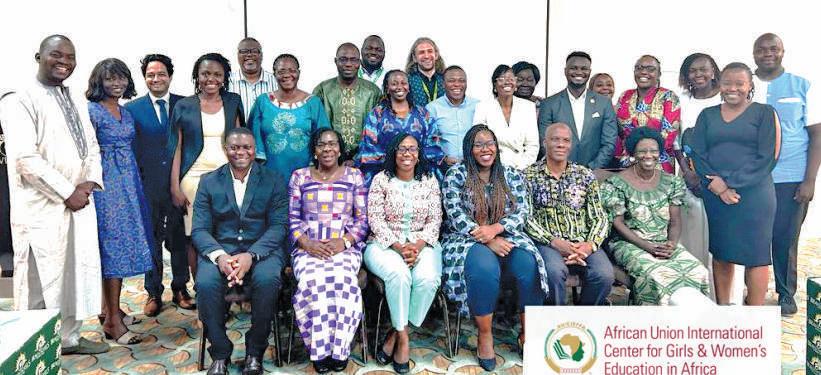
Gender Is My Agenda Campaign (GIMAC)
As a member of the steering committee, FAWE supported the convening of the network’s meeting in February 2023 and July 2023 in Nairobi. FAWE led the education panel at GIMAC to focus on the AU theme of the year 2023 “accelerating the implementation of the African Continental Free Trade Area - AfCFTA”. The outcome statement included FAWE’s recommendation on the need for AfCFTA to undertake reform in education curricula to mainstream the use of ICT in education at all levels. FAWE’s recommendation on the role of education in AfCFTA was included in the outcome document presented to the African Union Gender, Women and Youth Directorate. FAWE was also nominated as the thematic lead for GIMAC for 2024.
Education at the Centre of the Implementation of AfCFTA
By Emily Buyakii
Communication Officer
It has been two years since the AfCFTA (African Continental Free Trade Area) agreement became operational. The AfCFTA is a free trade area agreement among African countries and it was established in March 2018 by the African Union with the goal of promoting trade and economic integration among African countries.
At its inception, the World Bank in its 2020 report
estimated that the implementation of the AfCFTA would spur larger gains for women, with a 10.5 percent increase (compared to 9.9 percent for men) in their wages. To actualize this estimation, it is important to identify the possible challenges that could hinder the inclusion of women and girls in the implementation of the AfCFTA and potential impacts and implication on their human rights and propose solutions to not only address those challenges but to also enhance partnerships with the relevant AU Organs and stakeholders to curve the unintended consequences of AfCFTA on girls and women’s human rights.
In alignment with the 2023 AU theme of the year, “Acceleration of the African Continental Free Trade Area (AfCFTA) Implementation”, the 39th pre-summit consultative meeting was held from 12– 14 February 2023 in Addis Ababa, Ethiopia under the theme: “The Implementation of the AfCFTA: Breaking Trade Barriers of African Women and Youth to Ensure their Inclusion”.
The AfCFTA anticipates boosting the continent’s income by 450 billion USD and increasing intra-Africa exports by over 81 percent. It is also expected to lift 30 million people out of extreme poverty. With women constituting more than 50 percent of the continents the population, the need to invest in women and girls’ education cannot be emphasized. It remains an important tool to solving existing inequalities that lead to unequitable access to productive inputs, such as land, labour as well as capital and under-representation in the decision-making structures.
19 FAWE ANNUAL REPORT 2023
Source: AU/CIEFFA: Participants of the CESA Cluster meeting held on 12th September 2003 in Ougadougou, Burkina Faso.

(From left) Ms. Munnira Katongole Youth, Joint UNAIDS-Education Plus, Ms. Fraciah Kagu, Advocacy and Partnerships Officer, FAWE and Dr. Musavengana Chibwana, Senior Education and Humanitarian Advisor SCI-AULO during the panel discussion at GIMAC Conference. (Not pictured is Ms. Victoria Egbetayo Lead, Global Public Policy, Advocacy and Partnerships at the Global Partnership for Education as she joined the discussion online).
FAWE held a panel discussion at the 39th GIMAC presummit meeting dubbed “Education as a catalyst in the roll-out of the African Continental Free Trade area.”
Moderated by FAWE’s Advocacy and Partnerships Officer Ms. Fraciah Kagu, the diverse panel included Ms. Victoria Egbetayo, Lead, Global Public Policy, Advocacy and Partnerships at the Global Partnership for Education, Ms Munnira Katongole, Youth, Joint UNAIDS-Education Plus and Dr. Musavengana Chibwana, Senior Education and Humanitarian Advisor SCI-AULO.
One of the greatest take aways from the discussion was that there was an urgent need to revise education curriculums. Education curriculums form the base that is much needed to equip citizens with the pre-requisite knowledge and technical know-how to navigate trade; be it in country trade or cross-border trade.
Speaking during the webinar session, Ms. Victoria Egbatyo stated “Globally, two thirds of countries have cut down domestic education financing and as a result, 87% of children cannot engage in basic reading and writing.”
Literacy is a key requirement for almost every sector including the Small and Medium Enterprise space. Therefore, it is paramount that everyone receives even
the most basic education in order to competitively participate in any sphere of trade.
Dr. Musavengana Chibwana added, “A relevant education curriculum is key. It needs to ensure that it has an innovative and entrepreneurial element. It needs to respond to the needs of the continent.”
Representing the youth, Ms. Munnira Katongole reiterated the need to build models that enable young people to think critically. She added that a good place to reach the youth is through social media platforms which have proven effective in meaningful youth engagement.
Ms. Munnira also decried the fact that women are still receiving the short end of the stick when it comes to opportunities. “We know that in the informal economy, women make up the bulk of the economy, but their agency and intellectual power is often overshadowed! This needs to change. Let’s look at the AfCFTA as an avenue for creating not just jobs but quality jobs.”
Added Ms. Munnira Katongole.
Education is one of the most powerful tools by which people can lift themselves out of poverty, and fully participate in their communities. In particular, educating girls has proven to be one of the most impactful ways
FAWE ANNUAL REPORT 2023 20
of breaking the cycle of poverty. Girls with an education can better access the labor market and get jobs with higher wages. Better educated women can make informed choices about matrimony, maternity, and the nutrition and health of their children. Education also helps women to take on leadership roles in public life, contributing to the decisions that will affect their lives and their communities[1]
National Advocacy
FAWE chapters across Africa are making significant strides in advancing gender-responsive pedagogy (GRP) and advocating for girls’ education. In Burkina Faso, FAWE successfully updated and integrated the gendersensitive pedagogy module into the initial training program for schoolteachers and early childhood educators. This initiative, implemented at the National Institute for the Training of Education Personnel (INFPE), equipped 26 supervisors, trainers, and heads of technical directorates with essential knowledge on gender-sensitive pedagogy.
Meanwhile, FAWE Mali orchestrated a successful campaign for the re-entry of girls into school. Collaborating with the National Directorate of Basic Education and the Children’s Government, they sensitized parents, leading to 20 girls returning to school with financial support. Additionally, FAWE Mali, through digital campaigns, raised awareness on sexual and reproductive health rights (SRHR) and protection against harmful practices like child marriage and FGM, reaching over 11,000 individuals across various social networks.
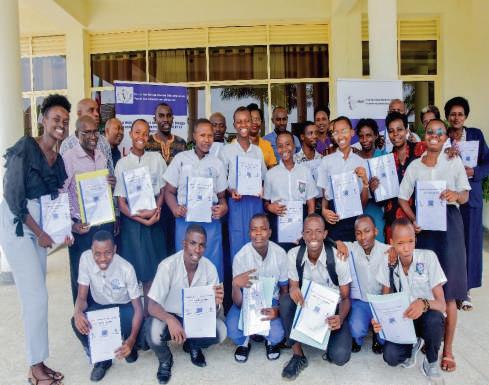
11,000
FAWE Mali, through digital campaigns, raised awareness on sexual and reproductive health rights (SRHR) and protection against harmful practices like child marriage and FGM, reaching over 11,000 individuals across various social networks.
26
Supervisors, trainers, and heads of technical directorates equipped with essential knowledge on gendersensitive pedagogy in Burkina Faso.
FAWE chapters continue to advocate for GRP implementation and gender equality in education systems. FAWENA, in partnership with the Training Center for Primary School Teachers, facilitated pedagogical training sessions focused on GRP. Gender and education focal points were empowered to integrate FAWE’s vision into their teaching practices.
In Gabon, FAWE played a pivotal role in shaping education policies by contributing to the development of the country’s education sector plan. In Zambia, FAWEZA conducted budget analyses and developed a Health Policy Brief to advocate for improved health allocations in alignment with the Abuja Declaration. Similarly, FAWE chapters in Kenya and Liberia addressed gender-sensitive barriers to education and actively participated in policy formulation processes to enhance educational standards and opportunities for girls and women.
Through collaborative efforts and strategic advocacy, FAWE chapters are instrumental in creating inclusive and empowering learning environments that uplift and support girls’ education across Africa. Their initiatives not only address immediate challenges but also pave the way for sustainable change and progress in the realm of education and gender equality.
21 FAWE ANNUAL REPORT 2023
20
Successful campaign by FAWE Mali for the re-entry of girls into school resulting to 20 girls returning to school with financial support.
Students and teachers pose for a photo after a Tuseme training session led by FAWE Burundi in Bujumbura in 2023.
Commemoration of International Days
FAWE marked the International Day of Education on the 20th of February 2023 through a joint event with FAWE Kenya at the Kenya Institute Curriculum Development (KICD) under the theme to invest in people, prioritize education”. The event brought together the Ministry of Education (University, Basic Education, TVET and the Policy and Partnership), Teachers Service Commission, KICD, Kenya Education Management Institute, Partners and young people. The FAWE Africa Executive Director
1
2
3 4 4
Ms. Martha Muhwezi gave the keynote address reiterating the need to invest in education especially given the negative impact of COVID on education gains. FAWE also, published an article titled It’s NEVER a Competition: Equality in Education beyond enrolment and retention of Girls in schools that was published on the Kenyan Daily (Nation). https://nation.africa/ kenya/blogs-opinion/blogs/equality-in-education-isnot-competition-between-girls-and-boys--4097780 Other activities to commemorate international days in 2023 included;
International day for women and girls in science- (11th February 2023) FAWE developed an article titled Let’s encourage more girls to take up Science while still at school. The article highlights the continued need to encourage women and girls in science and the role FAWE has played in the promotion of STEM https://fawe.org/?p=38538
FAWE marked the International Women’s Day on the 8th of March 2023. The article developed to mark this day titled Innovation and Technology: A tool for girls and Women’s Education explored the impact of the digital gender gap on widening economic and social inequalities and called for an inclusive and transformative technology and digital education which is crucial for a sustainable future. https://fawe.org/?p=36881
International Girls in ICT Day 25th April: Conducted an open dialogue on “Digital Skills for Life” across FAWE Anglophone NCs which promoted embracing of digital solutions among girls as part of advocating for enrolment of girls into STEM courses.
FAWE also developed an article titled Ensuring Digital Safety for African Children: Protecting Their Rights in the Digital World. The article highlighted our collective responsibility to ensure their safety and protect their rights https://fawe.org/?p=44349
On the 13th of October FAWE joined FAWE Malawi in commemoration of the International Day of the Girl child. The FAWE ED gave a presentation on the theme Invest in Girls’ Rights: Our Leadership, Our Well-being” highlighting the need and benefit of educating girls. FAWE also inducted the FAWE Malawi board and supported the National Chapter in the launch of their refurbished offices.
FAWE ANNUAL REPORT 2023 22
Empowering Girls: Sparking a Passion for Science in School
By Stanley Muigai IT Lead
Innovate, demonstrate, elevate, advance was the theme for this year’s International Day for women and girls in Science. The theme, carefully thought, focused on the role of women and girls in Science as relates to the Sustainable Development Goals (SDGs).
Globally, women are typically given smaller research grants than their male colleagues and, while they represent 33.3% of all researchers, only 12% of members of national science academies are women. In cutting edge fields such as artificial intelligence, only one in five professionals (22%) is a woman. Despite a shortage of skills in most of the technological fields driving the Fourth Industrial Revolution, women still account for only 28% of engineering graduates and 40% of graduates in computer science and informatics. Female researchers tend to have shorter, less wellpaid careers. Their work is underrepresented in highprofile journals and they are often passed over for promotion[1].
The gender gap in Science continues to widen even in this day and age. Women founders of start-ups still struggle to access finance and, in large tech companies they remain underrepresented in both leadership and technical positions. They are also more likely than men to leave the tech field, often citing poor career prospects as a key motivation for their decision.
As the impact of artificial intelligence on societal priorities continues to grow, the underrepresentation of women’s contribution to research and development means that their needs and perspectives are likely to be overlooked in the design of products that impact our daily lives, such as smartphone applications[2].
Shifting lenses to Science, Technology, Engineering and Mathematics (STEM), women still continue to take the back seats. According to Infuss Health, women are underrepresented in STEM, with an average of 1 to 4 when compared to men. Many factors contribute to this, such as stereotypes and educational differences. These barriers apply to all women but are significantly larger for women in Africa. Despite this, African women continue to push past the stigma and become seen in the field of STEM.
For 30 years, FAWE has been on the fore front in advocating for quality education and training for women and girls in Africa. Working hand in hand with like-minded organizations FAWE has been able to push for the increased uptake of STEM subjects in schools. These efforts have borne fruit because as a result, some of the beneficiaries have proceeded to take up and thrive in Science intense courses such as Medicine and Engineering at university level.
In conclusion, in order for more women to involve themselves in Science, the culture has to be inculcated early while they are still in school. only 12% 22% 28% 40% of members of national science academies are women
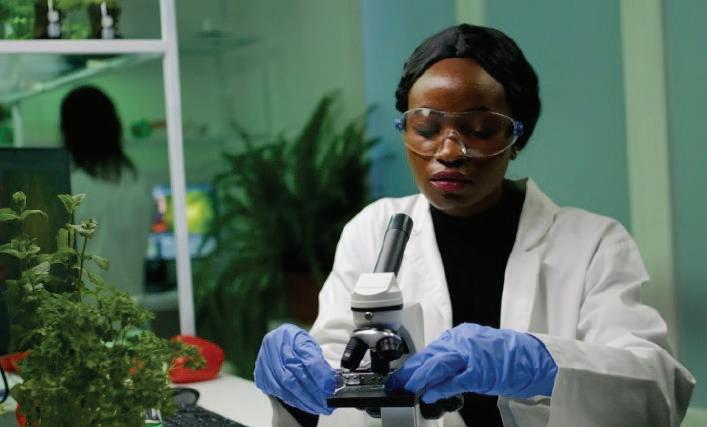
In cutting edge fields such as artificial intelligence, only one in five professionals (22%) is a woman
women still account for only 28% of engineering graduates and
of graduates in computer science and informatics.
23 FAWE ANNUAL REPORT 2023
A woman in a lab. Photo Credits: Freepix
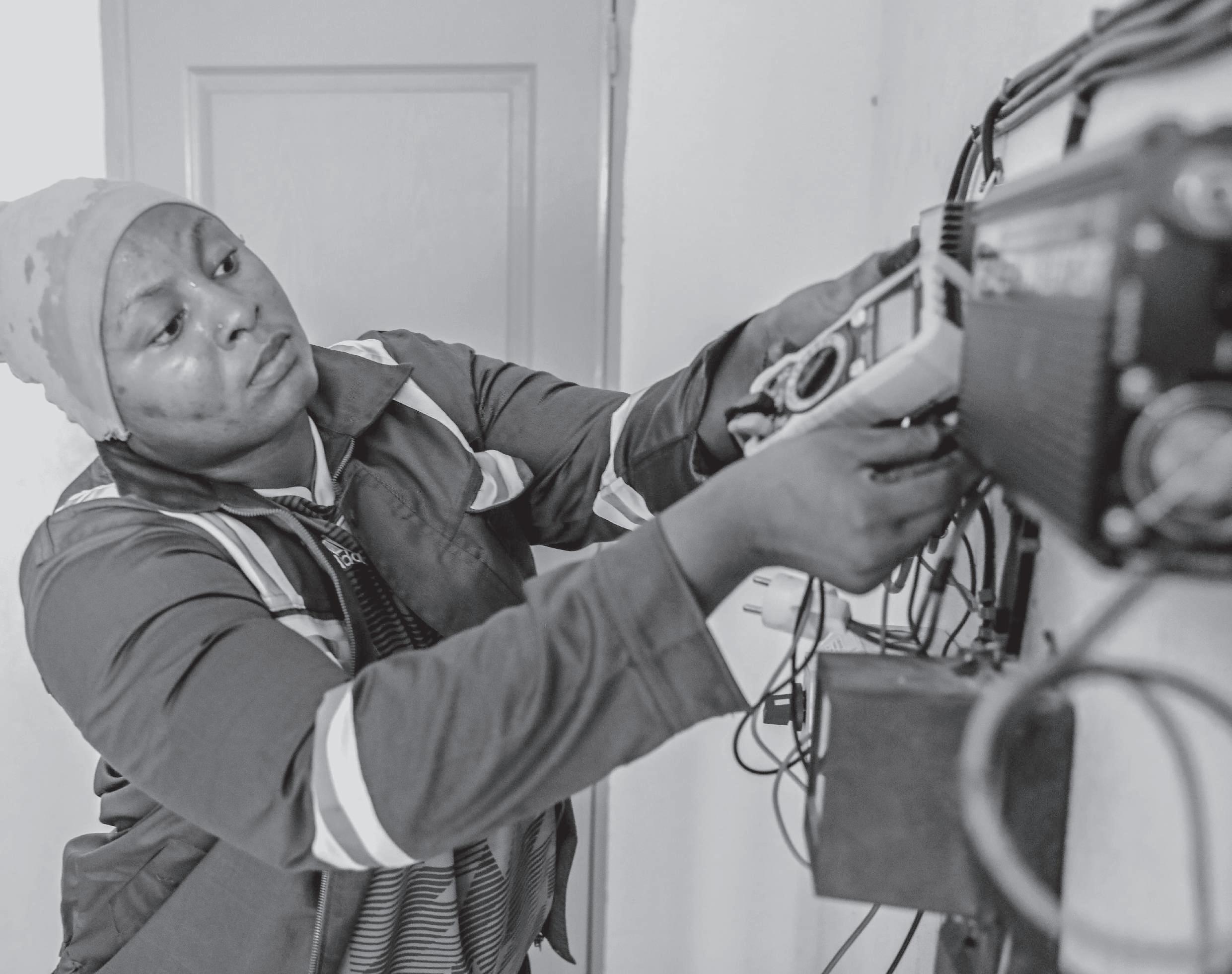
5
Counties in Kenya (Kajiado, Nakuru, Machakos, Nairobi and Narok) where Tamatisha! project was rolled out.
7,263
Learners, 6,184 girls (85%) and 1,079 boys (15%) were reached from 10 Tuseme clubs that were established
57
Teen mothers (3 from Primary schools, 54 from secondary schools) were successfully reentered back to the schools.
1,925
Teen mothers received each Kes 35000 (approximately $250 per project) as capital fund for small scale businesses to support them raise funds to take care of their children while they are in school.
Empowering African girls and women through gender-responsive programmes
Tamatisha!
This project was supported by the Ford Foundation towards reduction of teenage pregnancy and champion for school re-entry among teen moms in 5 counties in Kenya (Kajiado, Nakuru, Machakos, Nairobi and Narok). The project results included training of Headteachers/ Principals and teachers on FAWE models including Tuseme and GRP towards transforming ordinary schools into centres of excellence. 10 Tuseme clubs were established where 7,263 learners, 6,184 girls (85%) and 1,079 boys (15%) were reached leading to increased learning outcomes, improved life skills among learners, enlightened and empowered through timely and factual information sharing sessions, mentorship sessions. 57 (3 from Primary schools, 54 from secondary schools) teen mothers were successfully re-entered back to the schools. 1925teen mothers received each Kes 35000 (approximately $250 per project) as capital fund for small scale businesses to support them raise
funds to take care of their children while they are in school. The teen mothers were trained on business management and entrepreneurial skills specifically running of a business, mitigating against loses, maximizing on profits and the importance of savings. The project also hosted 5youth mentorship Forums, , 54 technical working groups and 32 community dialogues to create awareness on prevention of teen pregnancies and importance of re-entry. Through the mentorship forums boys were empowered to be champions of girl’s rights in reduction of teen pregnancies and shunning of harmful cultural practices such as child marriages and Female Genital Mutilation (FGM). In addition, from the TWG, the project managed to support meetings that led to the development of county specific Gender Policies that are at the implementation stages across the counties. To commemorate international menstrual hygiene day the project donated dignity packs to over 800 girls, this in a bid to increase retention in school.
Edufam
In 2023, FAWE partnered with COCAFEM in the dissemination of research findings conducted in Rwanda, Democratic Republic of Congo (DRC), and Burundi on access to education among marginalized girls and inclusion of women in positions of influence in the ministry of education. The findings showed that there was very low school attendance among marginalized girls especially in refugee camps, and displaced populations. Girls’ low school attendance was caused by cultural practices where education for girls was not valued because of the belief that they would be married off anyway, girls’ education deemed a “waste of already scarce resources”.
The research also revealed very low numbers of women in the position of influence in the education sector, due to the highly patriarchal leadership in DRC and Burundi. Rwanda had better representation of women but still not adequate to influence tangible policy formulation that promote girls’ education. Three refresher trainings on FAWE’s models, GRP and Tuseme were conducted in the three countries to reinforce the initial trainings conducted with an aim of effectively integrating gender responsiveness, assertiveness, and investment in schools that promote conducive learning environment. Three monitoring visits were also conducted. One of the recommendations was on compliance on the number of training days (any training less than 5 days is not sufficient). The evaluations also pointed out to the value addition of the models to the EDUFAM
project which improved gender responsive teaching and learning that promoted and encouraged school attendance.
Imarisha Msichana!
Imarisha Msichana equivalent meaning to “Build Up the Girl’ is a program implemented by FAWE in partnership with the Mastercard Foundation, the program is aimed at ending teen pregnancy in Kenya and is being implemented in 20 counties in Kenya namely: Nakuru, Nairobi, Machakos, Elgeyo Marakwet, Kiambu, Garissa, Bungoma, Kakamega, Nyeri, Migori, Murang’a, Kajiado, Narok, Homa-Bay, Trans-Nzoia, Nyandarua, Busia, Meru, Siaya, and Turkana.
A key highlight activity for the program has been the holding of the boys and young men conference in August 2023 across all 20 counties of implementation. The conferences raised awareness on boys and young men role in ending harmful cultural barriers and stereotypes such as FGM, child marriage, sexual harassment and abuse, period shaming among others that hinder girls’ full participation in education. As a result, the boys including those in primary and high school, young men from the community operating boda bodas, religious leaders, chiefs among others applauded FAWE for having an intervention that targeted the male community members. Consequently, they launched the “I Care About Her” campaign which will be led by boys and men as allies and champions of girl’s rights.
In addition, the Tuseme clubs’ activities within 160 schools across Kenya have been established and they are making great impact in empowering young people,
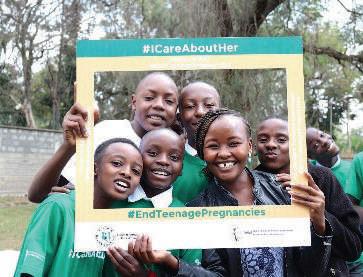
25 FAWE ANNUAL REPORT 2023
FAWE’s Programme Officer Ms. Naomi Kamitha poses for a photo with students at the launch of the ‘I Care About Her Campaign’.
especially girls to speak up. As a result, Mastercard Foundation partnered with FAWE to document the impact in one of the schools in Narok County, Suswa Girls Secondary School. See video below:
• https://www.youtube.com/watch?v=lYMFQ7ruuTk
To further strengthen the clubs, all 160 schools are now equipped with desktops and connected to internet to enhance access to digital technology for young people. Basic computer skills and online safety training has also been conducted for schools in 15 counties and the remaining will be concluded once schools reopen in January 2024. This training will ensure that the students and club patrons are able to use to the desktops efficiently and responsibly for enhanced learning outcomes and to access the digitized Tuseme content once digitization is completed in ongoing partnership with Kenya Redcross Society.
Trainer of Trainers for menstrual hygiene was also conducted for the participating 5 pilot schools. Representatives from each school including a tailor, patron and teen mothers’ representatives were trained on production of reusable menstrual hygiene products. The set up of the Mothers Clubs has been completed and the machines and other materials needed for production have been supplied. These centres will be run within the structure of the Mothers Club to ensure
that girls within the partner schools and neighbouring community have access to much needed menstrual hygiene products to reduce disruption of their studies and overall period poverty
Digitalising training content for Gender Responsive Pedagogy
FAWE in partnership with UNICEF (ESARO & WCARO) and UNESCO-IICBA finalized on the digital GRP platform (English) and pilot a TOT training conducted from 26th June to 6th July 2023. The updated platform was launched on November 21st, 2023, during the FAWE International Girls Conference.
Gender Responsive Pedagogy eLearning Course
Launched at FAWE Conference
By Martha Muhwezi, Helene Cron, Ikuko Shimizu, and Quentin Wodon
November 28, 2023
Martha Muhwezi is the Executive Director of the Forum for African Women Educationalists. Helene Cron and Ikuko Shimizu are Education Specialists at UNICEF ESARO and WCARO, respectively. Quentin Wodon is Director of the UNESCO International Institute for Capacity Building in Africa.
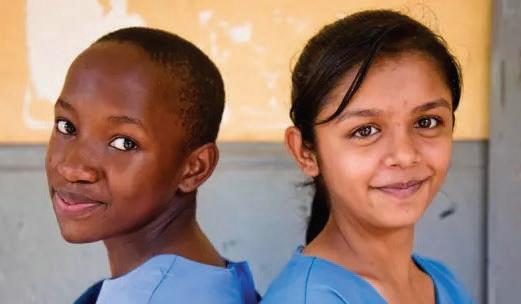
FAWE ANNUAL REPORT 2023 26
Photo credits: FAWE RS
On November 21, 2023 the Forum for African Women Educationalists (FAWE), the UNICEF Eastern and Southern Africa Regional Office (ESARO) and West and Central Africa Regional Office (WCARO), and UNESCO’s International Institute for Capacity Building in Africa (IICBA) jointly released an online self-paced eLearning course on Gender Responsive Pedagogy (GRP) at a plenary session of FAWE’s Triennial Conference on Girls’ Education in Nairobi. The course builds on a previous facilitated course and years of experience of FAWE and its partners, including its training guide for teachers and other educationalists.
The self-paced eLearning course is free for anybody to take at no cost on IICBA’s new eLearning platform. It will be also accessible through links to IICBA’s platform from UNICEF’s Agora platform and FAWE’s website. The GRP course is currently available in English and is being translated in French. The course can be adapted to country needs based on demand, as has been previously the case with paper-based GRP training modules used in countries such as Rwanda and Mali. Teachers and school administrators who complete the course and pass a short test at the end of the course receive a certificate of completion, contributing to their continuous professional development (CPD) journey.
The GRP model trains both male and female teachers to be more gender aware and equips them with the skills to understand and address the specific learning needs of both sexes. It develops teaching practices that engender equal treatment and participation of girls and boys in the classroom and in the wider school community. The eLearning course builds on training implemented in person in 33 countries where FAWE has presence including among others Burkina Faso, Chad, DRC, Ethiopia, Ghana, The Gambia, Guinea, Kenya, Malawi, Namibia, Rwanda, Senegal, Tanzania, Uganda, and Zambia.
The GRP model trains both male and female teachers to be more gender aware and equips them with the skills to understand and address the specific learning needs of both sexes.
FAWE started to develop the GRP model more than 15 years ago to address the quality of teaching in African schools and equip teachers with knowledge, skills, and attitudes to empower them to respond adequately to the learning needs of girls and boys with gender-aware classroom processes and practices. Teaching quality has a significant impact on academic access, retention, and performance. Yet many teachers in sub-Saharan Africa, conditioned by male-dominated values and social norms in their communities, employ teaching methods that do not provide equal opportunity for participation by girls and boys in the classroom. Neither do these methods account for the individual needs of learners, especially girls. We also know that male teachers dominate the teaching profession in many countries especially at the secondary level and in rural settings. In many countries, less than 20% of secondary school teachers are female, and the share of school principals who are women is even lower.
The course is structured into two parts or modules. The first part on teaching and learning consists of eight units. The first two units are on gender and human rights. The next six units are on various aspects of gender responsiveness, including for schools and management systems; learner-centered pedagogy; language use; lesson planning; teaching and learning material; and classroom setup and management.
The second part of the course is on gender-based violence and other factors that are known as causes of school drop-out of girls, in particular. It has four units on sexual and reproductive health for genderresponsive schools, school-related gender-based violence, engaging stakeholders and advocacy, and design, monitoring, and evaluation. Each of the two parts should take only a few hours to complete.
Our hope is that this holistic course will be widely used by teachers, school principals, Ministries of Education, and development partners. For teachers, the course is a tool that can be used to strengthen teaching practices and student engagement to help create a gender responsive classroom environment. It can also serve as a source of creative and participatory activities that help create a gender responsive classroom. For school principals and other administrators, the course can serve as a reference for school management to guide the creation of gender responsive school systems, for creative engagement of community stakeholders in GRP, and for supporting the monitoring and evaluation of gender responsive school systems.
27 FAWE ANNUAL REPORT 2023
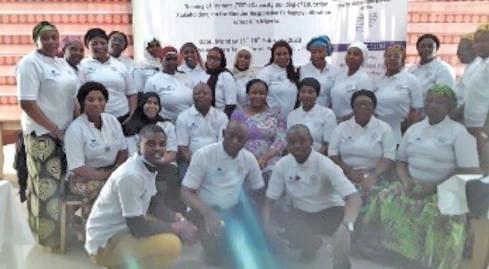
Echidna Giving Phase III
FAWE Eswatini was onboarded as one of the implementing countries under this grant and funds disbursed to the chapter. FAWE Nigeria developed an abridged version of the Safe Schools Declaration and a training manual which was used to train 26 teachers. Following the training, the participating head teacher conducted a security sensitization session for his pupils and staff members.
The head teacher also managed to get the State Universal Basic Education Board to construct perimeter fences in some primary and junior secondary schools in Adamawa state. Following the GRP trainings in Nigeria, FAWE Nigeria was invited to register with the Educationin-Emergency Technical Working Group (EiEWG) and has been participating in the ongoing community mobilization for the 2023/2024 Enrollment Drive Campaign (EDC), which kicked off on 21st August 2023. FAWE Nigeria specifically contributed to enrollment of girls in school. The Institute of Adult Education under Ministry of Education, Science and Technology (MOEST) invited FAWETZ to conduct a training of trainers training for adult education module developers, authors and tutors.
Make Way
FAWE successfully engaged the SRHR Alliance Uganda as a Strategic Partner Organization (SPO) in Uganda under the Make Way Programme. MOG was signed between FAWE RS and SRHR-Alliance and funds disbursed which promoted implementation of program activities increasing FAWE’s contribution to the consortium. FAWE partnered with UNESCO in conducting Eastern and Southern Africa (ESA) ministerial commitments which advocated for comprehensive sexuality education across 5 countries. The ESA commitment advocates for
age-appropriate comprehensive sexuality education in schools. The consortium refers to the implementation of CSE in Zambia as a benchmark for success story to be replicated in other countries. FAWEZA has been part of the taskforce that works with the Zambia Ministry of Education in integration of CSE in the Zambia curriculum. FAWE coordinated development of the meaningful Youth Engagement manual in the Make Way consortium, the manual was piloted in Kenya to be replicated in Ethiopia, Uganda and Rwanda in the next reporting period. Over 55 in school safe spaces have been formed in Rwanda which facilitated amplifying of voices of the marginalised. 2024 lobby and advocacy plans, budgets, workplans and results framework were developed in all the 5 countries and submitted to Wemos. FAWE staff participated in the key informant interviews that led to the development and finalization of the mid-term report (MTR) which guided and informed 2024 L&A plans. The MTR provided crucial findings that confirmed that the program is on track of achieving its long-term goals having achieved short and mid-term goals as per the TOCs. It also identified gaps, provided solutions to some challenges and also gave overall recommendations on what was to be done to achieve the most of the remaining 2 years of the program. Final FAWE Programmes Mid Year Implementation Report Jan - Jun 2023 English28.11.2023.docx
Break Free Alliance
The BF! Regional, Kenya and Ethiopia consortium held their outcome harvesting and developed the joint country report. The report was successfully shared with Plan Netherlands for Consolidation and submission to the Ministry of Foreign Affairs (MoFA). MoFA approved the report which paved way for the 2023 disbursements. For the first time since program inception, MoFA held a country monitoring visit in a BF! program country (Ethiopia) where FAWE is the lead. The MoFA representative appreciated the dynamics of implementing an advocacy program in a conflict setting and the challenges experienced by the program team. The BF program undertook its midterm review. The review acted as a benchmark for the progress made since the program inception in 2021 . The midterm review highlighted that in all the 9 countries the program has been able to create awareness around SRHR, increase youth participation and demand for SRHR services. The midterm review provided an opportunity for reflection on successes made, the changing context of programme implementation and development of the roadmap for the remaining period.
FAWE ANNUAL REPORT 2023 28
FAWE Deputy Executive Director Ms. Teresa Omondi-Adeitan (center) with newly trained GRP Trainers of Trainers in Nigeria in February 2023.
In Burkina Faso for the first time, the FAWE GRP model was integrated in the training program for schoolteachers and early childhood educators at the National Institute for the Training of Education Personnel (INFPE) of the Ministry of Education. Roll out of the revised module has commenced in the in INFPE training schools. To support the roll out FAWE Burkina Faso trained 26 personnel from INFPE (supervisors, trainers and heads of technical directorates) on GRP. The team also trained 12 representatives of partner/involved Civil Society Organisations (CSOs) and 5 focal points from the relevant ministries (National Education, Health, Youth, Justice, Gender and Family) on effective advocacy/lobbying techniques. These CSOs are members of the three advocacy groups set up by FAWE Burkina as part of the Break Free programme.
Ethiopia has developed a Health and well-being being module in collaboration with the ministry of health. This is in response to the push back on CSE and SRHR in the country.
In Kenya, the program supported the formation of the gender and education technical working group which FAWEK co-chairs with the Ministry of Education. The working group supported the incorporation of FAWE GRP and SRGBV Principles into the draft Education and Training Sector Gender Policy and National Education Sector Strategic Plan 2023-2027. The Teachers Service Commission recognized the need for GRP and invited FAWEK to facilitate a session on GRP for its Gender Mainstreaming Committee. The program also supported the accreditation of FAWE GRP manual for use in the teacher’s development program. The GRP manual is under review by KICD. Incidences of teenage pregnancies among adolescent girls in schools where Tuseme was launched in 2022 have gone down from a total of 132 to 55 as at July 2023. Tuseme clubs have empowered adolescents to express themselves and learn about their SRHR including TP/CM and FGM/C.
In Zambia, through the use of sports tournaments, FAWEZA was able to support One thousand and seventy three (1,073) youths to access quality services. as part of advocacy on reentry, the program provides financial literacy and entrepreneurship skills for families with girls who have reentered schools. Out of 172 families of re-entered girls, 79 have successfully initiated their own businesses through the village-banking model significantly improving their financial well-being, economic prospects and the ability to keep girls in schools.
In Malawi, the program has contributed to the annual national budget analysis with a focus on the education allocation and further analysis of the areas funded by the education budget. Responding to the key ask from the budget analysis, the government of Malawi launched a $210 million project called the Malawi Education Reform Program from 2022 to 2026 and has since recruited 4205 teachers to improve learning outcomes for students in lower primary in government schools. FAWEMA under Break free has been popularizing the readmission policy through panel discussions on TV and radio jingles in various radio stations. In the 21 schools that Break free is implemented, in 2023/24 academic year 556 are readmitted learners (253 boys, 303 girls), 4 girls from the returnees have been come back from Child Marriage.
29 FAWE ANNUAL REPORT 2023
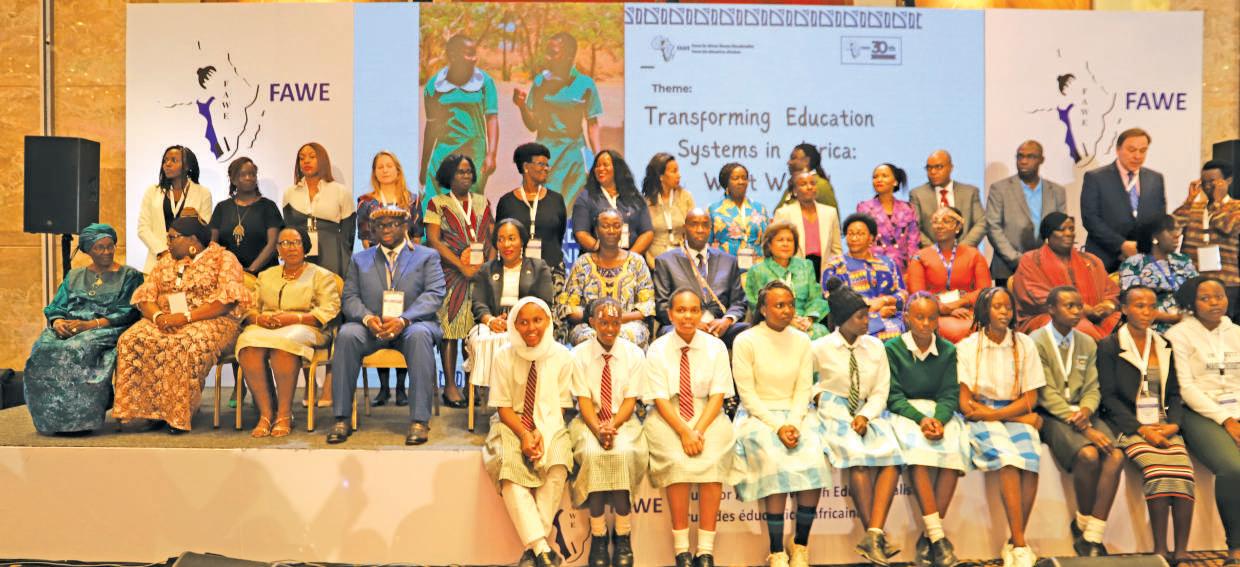
Women in Political Participation
Following development and scaling up of the model school module to 12 schools across 4 counties in Kenya, i.e. Nairobi, Machakos, Kajiado and Nakuru, FAWE in collaboration with IIDEA successfully co-hosted a sideevent titled “Leadership Unveiled: Nurturing Tomorrow’s Trailblazers from a Young Age” during the FAWE 3rd Triennial International Girls Conference on Education in Africa. The side event allowed teachers to share the impact of implementing the model school module.
The module enables learners to become engaged, em powered and be ethical citizens who are selfconscious about inclusion of girls in leadership. This is achieved by providing the learners with adequate and age-appropriate skills and knowledge that they deserve, and which they need to thrive in the 21st century. The Module provides every learner with seamless, competency-based knowledge on leadership and inclusion of girls and women in leadership.
The Module is steered by highly knowledgeable, reflective, professional teachers and trainers that have passion in the initiatives for inclusion of girls in leadership. They benefit from enhanced skills and confidence in a range of modern pedagogical tools such as coaching, facilitating, and mentoring. The teachers and trainers act more as role models for learners, caring for and inspiring every child to achieve their potential. The module also enables teachers and trainers to be flexible in adapting this module to meet the needs, talents, and interests of every child, constantly diagnosing the learner’s needs, and collaborating with other stakeholders that influence the child such as parents, religion, media, other professionals, opinion leaders, and the wider community.
UNESCO Spotlight series (FAWE/UNESCO)
In partnership with UNESCO, FAWE participated in development of a documentary featuring the importance of foundational learning and associated challenges in Ghana and Senegal found here. The Spotlight series aims to support countries as they follow up on their national SDG 4 benchmarks, as well as to inspire national and continental dialogue on foundational learning and lead to a peer learning mechanism embedded in continental institutions.
IFEEFA
Under the programme, school pupils have benefited from GRP based tutoring in Burundi, Chad, Gabon, Guinea, Mali, DRC and Senegal in STEM. A total of 4478 girls have been reached based on numbers of teachers and their average students. Further, Tuseme clubs have been set up in all the project’s target schools under the supervision of FAWE focal points, with the support of teachers who have taken part in Tuseme training. The teachers received Tuseme manuals to enhance their understanding of the module. 7721 students benefited from support lessons to offer suitable conditions to help girls’ retention and performance at school.
Training for journalists forming a network of women in the media and a content creation competition on the theme of girls’ education was organized by FAWE. A webinar was carried out following these two activities, bringing together experts and actors in the promotion of girls’ education in Africa for a discussion and, above all, allowing us to talk about the progress noted in school enrollment and retention girls at school. A communication campaign in partnership with different media was also carried out in parallel in
A group photo session after the opening ceremony of the 3rd FAWE Triennial International conference on girls’ Education in Africa, November 2023.
Senegal, Mali, Chad and Guinea with broadcasts on the various web platforms and in other countries where the IFEEFA project is implemented for the popularization of acquired knowledge and achievements in partnership with beneficiary schools.
KIX Karanta
FAWE conducted 11 capacity building sessions on education stakeholders on GRP and Tuseme in response to the various obstacles linked to the school environment and the special needs of learners. The GRP brought together 107 participants (52 women and 79 men) in Mali, Guinea, Burkina, Cote D’Ivoire, Niger. The Tuseme training brought together 267 participants including 137 girls/women and 130 boys/men in the same countries. Action plans monitoring is in progress, monitoring of Tuseme clubs is ongoing in all countries.
KIX Centers of Excellence
Training on COE was carried out in Mali, DRC, Senegal and Burundi. The literature review about girls’ schooling and the evidence for the centers of excellence model in the four countries was finalized in 2023. The research protocol and survey tools were also validated by ministries, directors and actors of Educatif’s system. 10 schools were tested as part of the centers of excellence using 3 components of FAWE Centers of Excellences model. Following the regional knowledge restitution and sharing workshop between the 4 beneficiary countries, a roadmap was developed for scaling up the project through the involvement of partners, ministries through their departments, civil society and some schools. Support for the Tuseme club for monitoring action plans is ongoing. The need to revitalize the network of women media, friends of girls, in education is being implemented in the 4 countries to involve the media in the access and retention of girls in school.
IsDB
A total of 175 beneficiary girls were engaged in STEMfocused remedial courses, exceeding the initial target
of 150. These courses were meticulously designed to enhance the girls’ understanding of STEM subjects and the language of instruction, equipping them with the knowledge and skills required to excel. Training on GRP for STEM and sessions on Tuseme were conducted in Burkina Faso, Senegal and Togo. Teachers in the partner educational institutions were sufficiently equipped with learner-centered pedagogical skills to improve STEM uptake among girls. 5 teachers were trained on GRP for STEM and 34 French teachers trained on Tele-communication and GRP. To raise the profile of high-level women scientists with significant careers, FAWE-Senegal produced a brochure presenting the careers of 25 women in various scientific fields to girls and the public.
Wellspring Philanthropic
FAWE held the third Triennial International Conference on girls’ education in Africa on 21st –22nd November at Emara Olesereni in Nairobi, Kenya. The theme of the conference was Transforming Education Systems in Africa: What Works! 300 delegates drawn from different sectors of education including FAWE membership, eight Ministers of Education, representatives from Regional Education bodies, Civil Society Organizations (CSO’s), Development Partners, Researchers, Education and Gender Specialists from National, Regional, Sub-regional and International Organizations were engaged. The twoday conference culminated in a call to action where the participants called upon national governments, CSOs, the private sector and the youth to “prioritize investment in girls’ education and ensure that they complete 12 years of free, compulsory, and basic education regardless of their background through increased budget allocation and domestic financing.” Link to Girls Conference Communique: https://fawers-my.sharepoint.com/:b:/g/personal/ cbarasa_fawe_org/EWoidTIQZ3BKgtv3TF1TFG0Bn sJCHhDnBK-4eSTRtg--JQ?e=8N4S5W 175
A total of 175 beneficiary girls were engaged in STEM-focused remedial courses, exceeding the initial target of 150.
Teachers were trained on GRP for STEM and 34 French teachers trained on Telecommunication and GRP.
In Senegal, 45 women scientists were profiled.
31 FAWE ANNUAL REPORT 2023
45
5
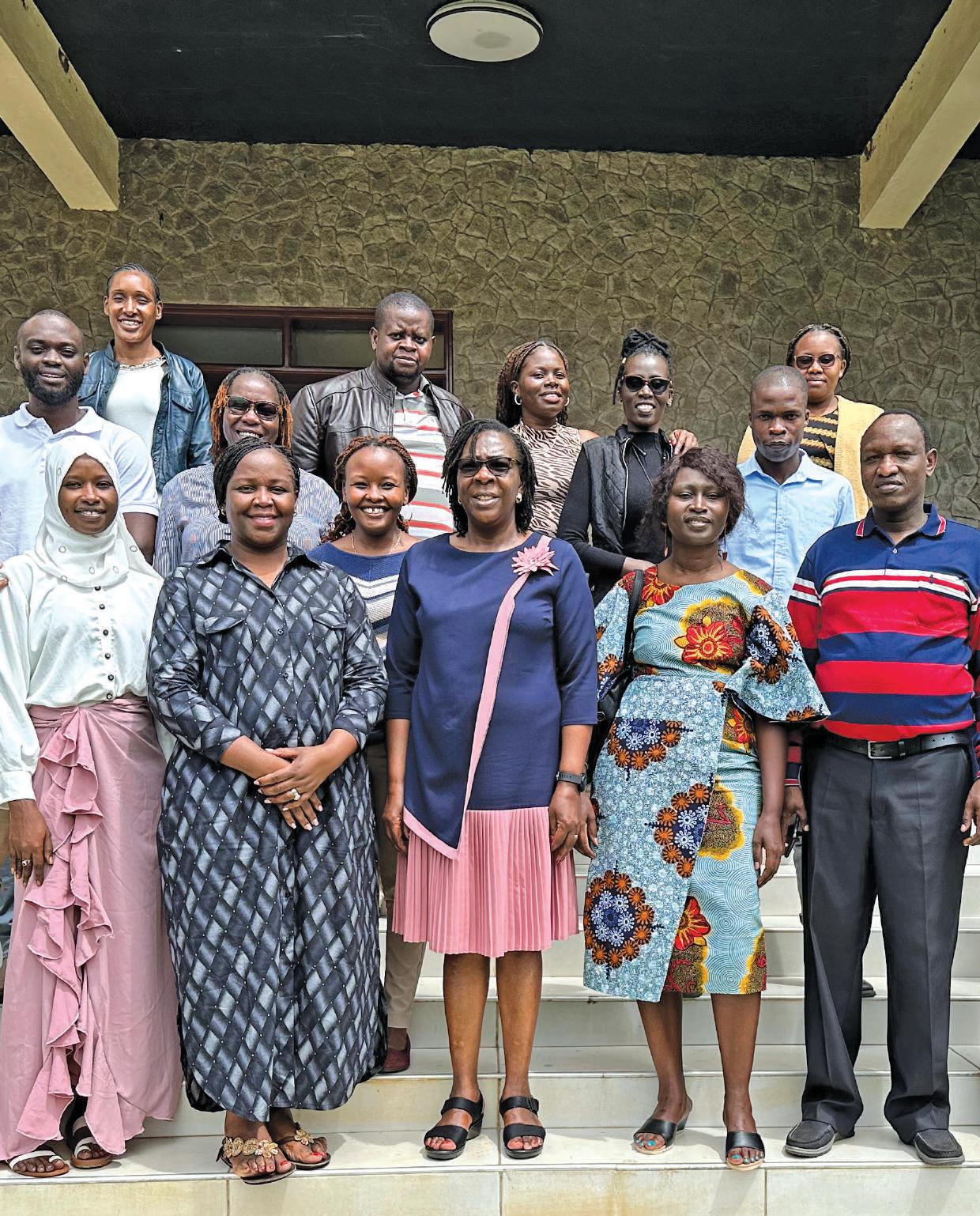
It’s all systems go! FAWE’s Institutional Capacity Strengthened
Moving and growing together
FAWE’s staff had a peer-to-peer session whereby they reviewed the KDHS 2022 study. The document entailed crucial SRHR findings that are relevant to FAWE’s work such as Female Genital Mutilation (FGM), early marriages, early childhood development, and gender-based violence. The emerging trends and latest findings will support FAWE’s resource mobilization efforts in responding to calls, promote more evidencebased programming and scaling up of similar projects in the country.
National Chapter Governance Systems
FAWE Regional Secretariat (RS) has played a pivotal role in bolstering the organizational capacities of her chapters. In 2023, FAWE RS management team actively supported the governance systems of FAWE Kenya, Senegal, Ethiopia and Rwanda. The support involved addressing staffing challenges and the need to sensitize both the board and staff on separation of duties between the board and secretariat.
This was achieved through sensitization on various
issues including transparency on board composition (specific to Senegal), financial management, human resource management, procurement processes, and project management (Reference to the five chapters). FAWE RS management team also guided the chapter on response to disciplinary issues and induction of new staff. Example of achievements from the support included transition of the FAWE Ethiopia National Coordinator, FAWE Kenya went cashless to improve financial management and accountability within the organization, revision of FAWE Kenya HR Manual, development of safeguarding and OSHA manuals. FAWE RS supported the chapters in recruitment of qualified staff (Rwanda and Ethiopia), procurement processes (Kenya and Ethiopia) and managing legal processes.
Similarly, FAWE RS supported the General Assemblies and induction of the new Boards of FAWE Ghana and FAWE Togo. A grant for institutional support was also given to FAWE Togo which propelled the chapter to kick-off operations. FAWE Togo has since recruited key personnel and has been able to finance utilities and purchased critical equipment. In the same breath, FAWE RS supported the board induction of FAWE Malawi and Sierra Leone in their Organization Capacity
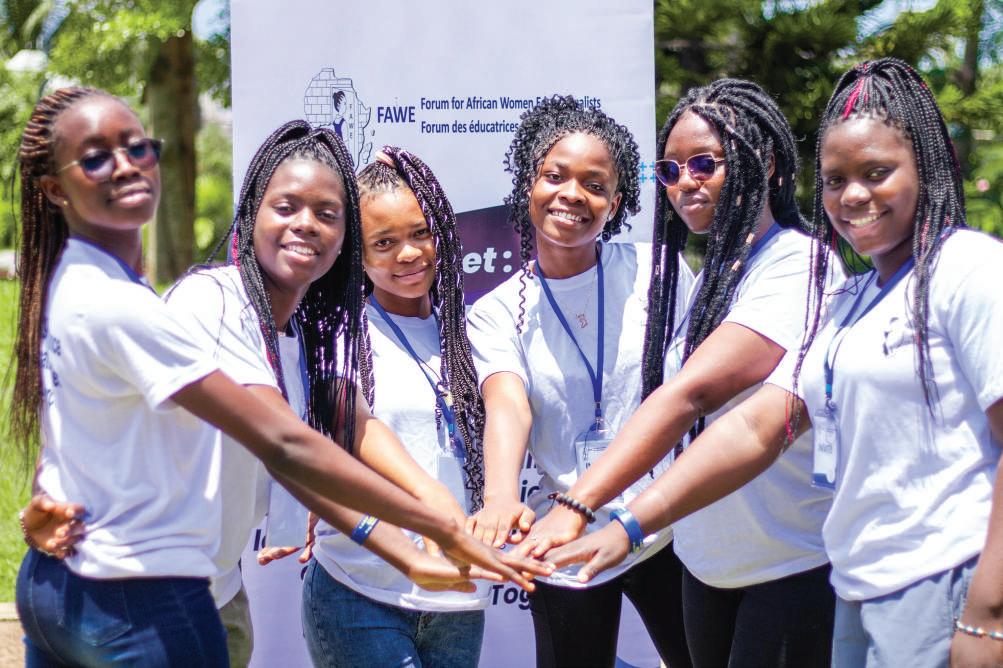
33 FAWE ANNUAL REPORT 2023
Participants of FAWE’s Tuseme model pose for a photo during FAWE Togo’s General Assembly in August 2023.
assessment leading to the development of the change strategy and new Strategic Plan for the year 2024-2028. Notably, FAWE RS supported the development of the organization’s structure for FAWE Zanzibar, providing guidance and expertise to ensure alignment with best practices and strategic objectives. FAWE RS actively assisted FAWE Zanzibar in the review of its procurement manual and procedures, facilitating the refinement of processes to ensure transparency, accountability, and compliance with regulatory standards. Additionally, FAWE RS extended its support to FAWE Kenya by conducting a comprehensive training session for the board members on governance principles, fostering a culture of effective leadership and oversight within the organization.
Moreover, noteworthy developments include FAWE Nigeria’s acquisition of new offices, reflecting the expansion and enhanced presence of the organization in the region. Additionally, FAWE Mozambique’s integration with MEPT underscores collaborative
efforts toward advancing education and gender equality. Through these initiatives and partnerships, FAWE RS continues to foster growth, innovation, and sustainability within the FAWE network, furthering its mission of empowering girls and women through education.
FAWE’s alumni
FAWE Africa Alumni Network held elections to elect the new board (2024 –2026) on 1st November 2023. Prior to this, the FAWE Alumni Operational manual was reviewed to guide the operations of the alumni at RS and chapter level. FAWE Tanzania recruited 17 FAWETZ Alumni to be FAWETZ Members. Part of the recruited members gave back to FAWETZ by contributing towards FAWETZ rent. The chapter has been involving the Alumni to develop proposals and other resource mobilization activities. FAWE Chad, Namibia, and Rwanda nominated FAWE alumni to join her board.
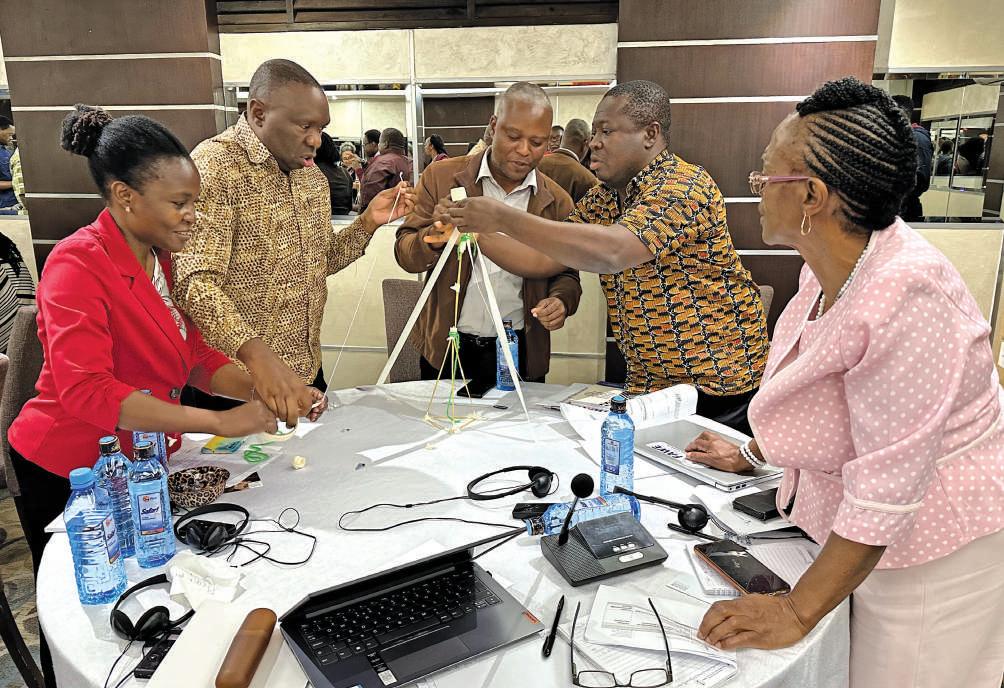
FAWE ANNUAL REPORT 2023 34
(From left) Ms. Winnie Mamawi, National Chapter Coordinator for FAWE Zanzibar, Mr. Costern Kanchele, Executive Director of FAWE Zambia, Mr. Wesley Chabwera, National Chapter Coordinator for FAWE Malawi, Mr. Richard Amoani, National Chapter Coordinator for FAWE Ghana and Prof. Nonhlahla Sukati, Board Member for FAWE Eswatini at a team building excercise in Nairobi, Kenya, November 2023.
RESOURCING FAWE – INVESTING IN EDUCATION
By Teresa Omondi-Adeitan, Deputy Executive Director and Head of Programmes.
FAWE’s performance over the last 30 years has critically informed the organisation’s relationships with development partners/philanthropists to invest in education work in Africa. During implementation of the just ended strategic plan, 2019 to 2023, FAWE continued to attract new partnerships to resource her strategy. The investment included supporting FAWE’s governance structures, monitoring visits that made FAWE’s work real with tangible results, research, enhanced staff capacity and advocacy at regional and global levels. FAWE shared her progress via bi-monthly newsletters not only to to update various stakeholders on out work but also increase ownership of our work.
Success in 2023 significantly advised the development of FAWE’s new Strategic Plan 2024 to 2028 demonstrating FAWE’s growth, learning, and improvement, including how FAWE has learnt to work within her mandate. During the year FAWE signed up new partnerships with the following partners;
v Together for Girls with support from Global Affairs Canada a two year project to implement activities in Malawi, Nigeria, and Zimbabwe addressing school-related Gender-based violence.
v Climate Action for Partnership in Education (CAPE) consortium (FAWE ACER and Aga Khan Foundation) that received funds from USAID. Employing education to address climate change
v The Mastercard Foundation Phase II Program – FAWE renewed her partnership with the Foundation expanding our reach from three African Countries to a total of 10 countries for a 7 year project. The project targets to provide second chance to over 10,500 girls/boys and young women/men to access tertiary education (TVET and Universities).
v International Development Research Centre (IDRC) with support from the Global Partnership
for Education (GPE) invested in consortium (FAWE, ACER and HERS-EA) to implement activities in Kenya, Uganda and Ethiopia. This project aims at improving FAWE’s Tuseme model to serve the refuges and internally displaced children.
The above mentioned grants are additional to the existing partnerships with the Mastercard Foundation providing comprehensive scholarships to students in Rwanda, Uganda and Ethiopia and SRHR programmes in Kenya, The Break Free Alliance and Make Way Consortium both funded by the Netherlands Government, Ford Foundation and Sexual Health and Reproductive Education (SHARE) supported by Global Affairs Canada all running complementing programmes to reduce teenage pregnancy and advocate for the re-entry of girls in school. Echidna giving and Wells Spring continue to trust in FAWE’s institutional capacity strengthening and have also invested in programmes that improve schools and teachers’ capacities. This is also complemented by the support of KIX (UNESCO, LARTES and KARANTA) in FAWE’s West African region. FAWE is equally indebted to the support received by Girls at the Centre Initiative (GCI), French Embassy, Malala Fund on regional and global advocacy, Bill and Melinda Gates supporting FAWE’s research work and International IDEA on women and political participation.
FAWE’s strong interest, commitment, engagement, significant and strong partnerships with civil society organizations at all levels, will continue to sharpen our skills in advocacy to deliver on education rights for women and girls in Africa. In 2024, the year of Education as declared by the African Union, FAWE will continue to persuade better investments in education, gender equality and women’s empowerment.
Education is the key driver of development and significantly reduces poverty and enhances individuals social-economic power of bargaining. Education delivers large, consistent returns in terms of income, and is the most important factor to ensure equity and inclusion[1]. FAWE continues to invite more investment into her education work. #investinFAWEinvestineducation.
35 FAWE ANNUAL REPORT 2023
[1] Education Overview: Development news, research, data | World Bank
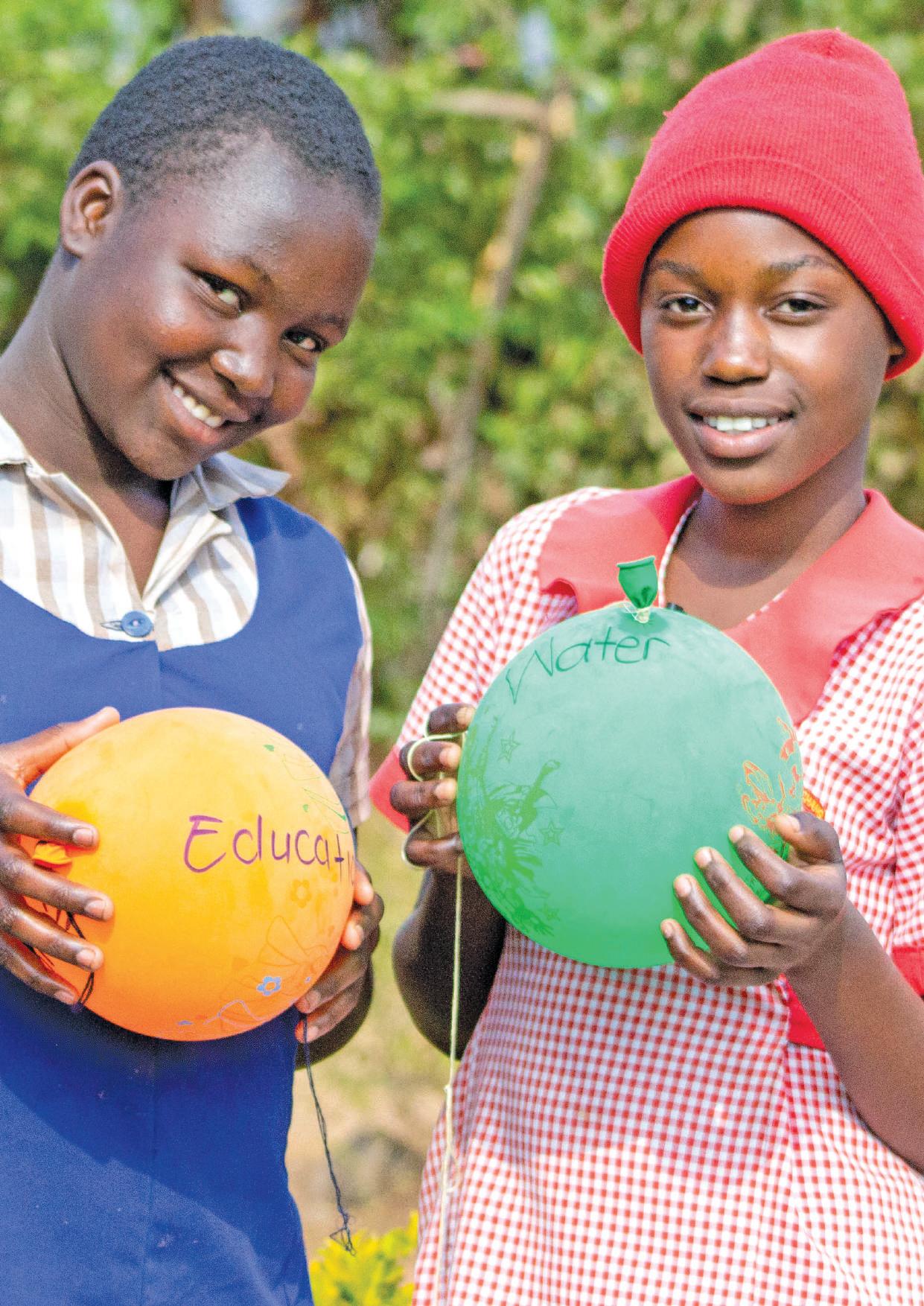



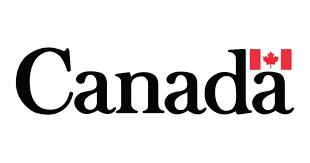


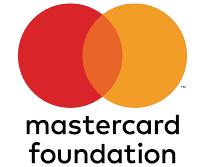


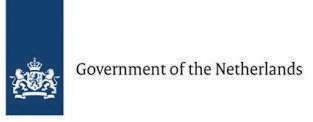

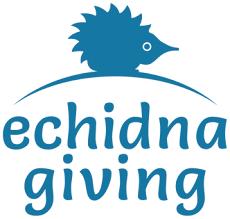
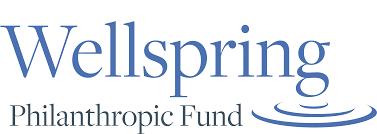




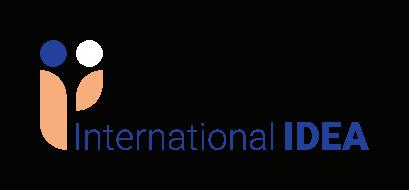
37 FAWE ANNUAL REPORT 2023 FAWE’s Partners
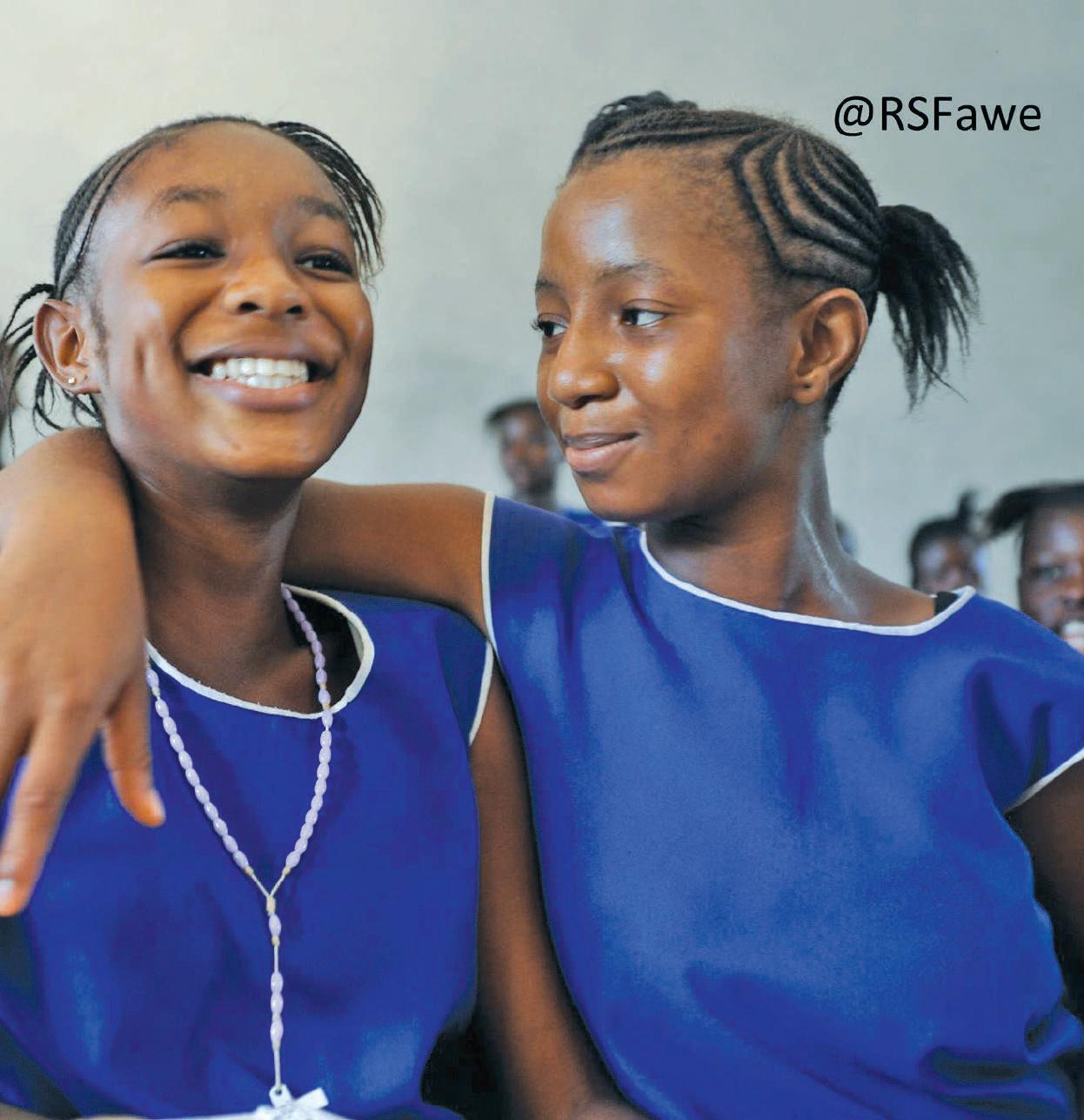
Propelling girls’ education agenda through research and evidence generation
FAWE ANNUAL REPORT 2023 38
Propelling girls’ education agenda through research and evidence generation
During the period under review, a significant milestone was achieved with the completion of 10 monitoring field visits across various countries, including Uganda for the Master Card Foundation HEAP project, Ghana for the SHARE project, Zambia for the Make Way and BF! Project, Kenya for the BFA project, Ethiopia for the BF!/MCF project, and Burundi for the KIX CoE. These visits were instrumental in enhancing the implementation of the projects, offering valuable insights and feedback that contributed to their improvement.
In parallel, a comprehensive study was initiated to explore innovative practices that bolster girls’ retention and transition to secondary and higher education in sub-Saharan Africa. This study, targeting Burkina Faso, Cameroon, Malawi, Mali, Mozambique, Niger, Sudan, Ethiopia, Kenya, Uganda, Zambia, and Zimbabwe, aims to identify effective strategies to support girls’ education. However, progress in Sudan has been delayed due to civil unrest in the country, underscoring the challenges faced in volatile environments.
To further strengthen its operational framework, FAWE developed an Organization Capacity Assessment (OCA) tool, available in both French and English, and disseminated it across all national chapters. This tool facilitated data collection in 24 chapters, the results of which were analyzed, validated, and presented in both languages during FAWE’s 3rd International Girls Conference on 20th November 2023. The insights gained from the OCA are expected to fortify the chapters, enhancing their capacity to fulfill FAWE’s vision and mission effectively.
Moreover, the development of FAWE’s strategic plan for 20242028 marked a significant phase of planning and visioning for the future. With the assistance of consultants, the strategic plan was meticulously drafted, validated, and subsequently launched at FAWE’s 3rd International Girls Conference on 23rd November 2023. This strategic plan outlines the roadmap for FAWE’s initiatives and endeavors for the coming years, setting a clear direction for its mission to empower girls and women through education.
Additionally, FAWE’s commitment to transparency and accountability was demonstrated through the publication of 7 reports on the International Aid Transparency Initiative (IATI) platform. These reports encompassed the 2022 annual reports for the BF! and Make Way projects, mid-term results for the BFA project in Ethiopia and Kenya, overall project targets at the outcome level for both BF! and Make Way, as well as the 2024 targets at the output level for these projects. The availability of these reports on the IATI platform, accessible via the provided MOFA link, underscores FAWE’s dedication to openness and its efforts to share progress and outcomes with stakeholders and the broader community
To further strengthen its operational framework, FAWE developed an Organization Capacity Assessment (OCA) tool, available in both French and English, and disseminated it across all national chapters.
39 FAWE ANNUAL REPORT 2023
2023 Highlights
FAWE Hosts the Much-Anticipated 3rd Triennial International Conference on Girls’ Education in Africa.
By Emily Buyakii Communication Officer
The atmosphere in Nairobi, Kenya, was charged with anticipation and enthusiasm as the Forum for African Women Educationalists (FAWE) commenced its highly anticipated two-day 3rd Triennial International
Conference on Girls’ Education in Africa. With the theme “Transforming Education Systems: What Works?” echoing across the venue, the conference aimed to delve deep into advancing girls’ education through innovative solutions tailored to address emerging trends affecting access to quality education.
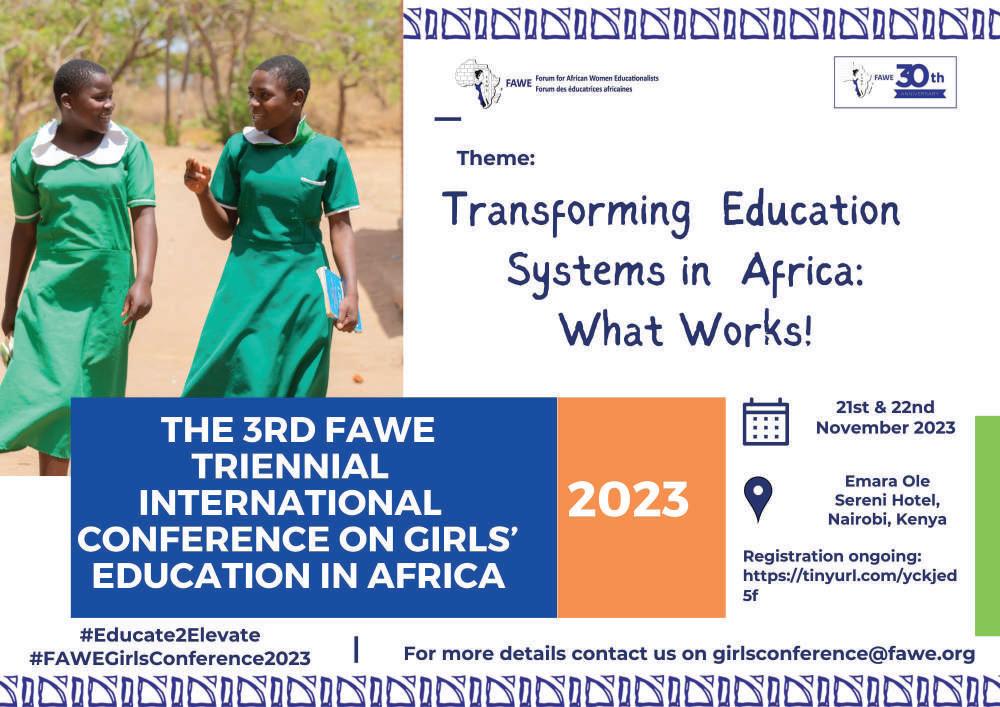
Hon. Simone De Comarmond, the then Board Chairperson of FAWE Africa ( 2021-2023), set the tone for the conference, expressing FAWE’s belief in the transformative power of education to elevate lives. “At FAWE, we believe in the power of education to transform lives. Our mantra is educate to elevate. This conference serves as a platform to collaborate, share insights, and advocate for the rights of every African girl to access quality education,” she affirmed.
The event drew together a diverse array of regional and global participants from different sectors of
education. Ministers of Education from Namibia, South Sudan, Sierra Leone, and Liberia, along with key representatives from regional educational bodies, Civil Society Organizations (CSOs), development partners, researchers, and education and gender specialists, converged to deliberate on critical issues surrounding girls’ education.
During the opening ceremony, Education Cabinet Secretary Hon. Ezekiel Machogu lauded FAWE’s advocacy efforts, acknowledging the organization’s significant contributions to improving the quality of
FAWE ANNUAL REPORT 2023 40
education in Africa. He highlighted FAWE’s partnership with the Kenyan government in establishing 160 Tuseme Clubs across schools in 20 counties, underscoring FAWE’s pivotal role in driving positive change in education.
Throughout the conference, participants engaged in paper presentations and discussions centered on the conference theme and sub-themes. These sub-themes included Enhanced gender equality in Education, Education and Technology, Technical Vocational Education Training (TVET) for girls, Addressing teenage pregnancies and ensuring access to education for all women and girls, and Education as a catalyst for girls and young women taking up leadership positions.
Ms. Martha Muhwezi, Executive Director of FAWE Africa, emphasized the importance of addressing barriers to girls’ education in Africa. She highlighted that the conference’s sub-themes were engineered to allow for learning, exchange, and the development of innovative solutions to increase the quality of education across the continent.
The conference also featured side sessions that delved into pressing issues related to girls’ education. One such session focused on preventing violence in and through schools in Africa. Participants engaged in dialogue and knowledge sharing on promising approaches for the prevention of violence, emphasizing the need for comprehensive strategies that encompass both preventative measures and robust support systems.
Another notable event was the Donor Round Table convened on November 20, 2023, in Nairobi, Kenya, aiming to foster collaboration among stakeholders for sustainable development partnerships. Attended by representatives from donor organizations, the private sector, and non-profits, it served as a platform for knowledge-sharing and synergy-building. Key highlights included discussions on localization, equitable funding flows, and partnership competencies. Strategic priorities for FAWE’s sustainability initiatives were outlined, with insights shared by panelists from various organizations such as Mastercard Foundation, Ford Foundation, UNESCO, OXFAM and DTB bank. The event concluded with a commitment to ongoing collaboration, knowledge exchange, and innovation, emphasizing joint initiatives and capacity-building efforts. Next steps include establishing communication platforms, exploring joint funding opportunities, and monitoring progress for effective and sustainable development efforts. Overall, the round table catalyzed
enhanced collaboration and collective action towards shared development goals.
Parallel sessions on increasing the uptake of STEM among female learners and preventing violence in schools further enriched the conference program. These sessions provided valuable insights and practical strategies to empower girls and create safe and inclusive learning environments.
As the conference drew to a close, Ms. Teresa OmondiAdeitan, FAWE Africa Deputy Executive Director & Head of Programmes, shared highlights of the FAWE’s new strategic plan 2024 - 2028. She emphasized FAWE’s commitment to ensuring equitable access to quality learning for all African girls and women. The strategic plan outlined four key pillars: Advocacy and Policy Influence, Knowledge Generation, Capacity Strengthening, and Collaboration and Networking.
In conclusion, the 3rd Triennial International Conference on Girls’ Education in Africa was a resounding success, bringing together stakeholders from across the globe to chart a course towards transformative action in education systems. FAWE’s unwavering dedication to promoting girls’ education in Africa was palpable throughout the conference, signaling a promising future of increased access and quality education for girls across the continent.
“At FAWE, we believe in the power of education to transform lives. Our mantra is educate to elevate. This conference serves as a platform to collaborate, share insights, and advocate for the rights of every African girl to access quality education,”
Hon. Simone De Comarmond, Board Chairperson of FAWE Africa
41 FAWE ANNUAL REPORT 2023

Executive Director Ms. Martha
shakes hands with the Kenyan Cabinet Secretary for Education Hon. Ezekiel Machogu
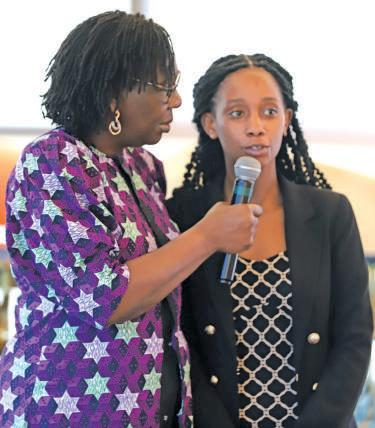
FAWE Executive Director Ms. Martha Muhwezi holds a microphone for FAWE Alumna Ms. Rachel Kamikaze at a parallel session dubbed “The Donor Roundtable”.
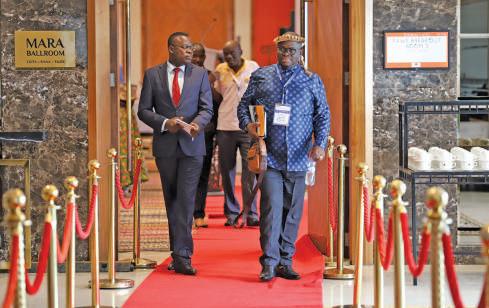
Royal
Chief
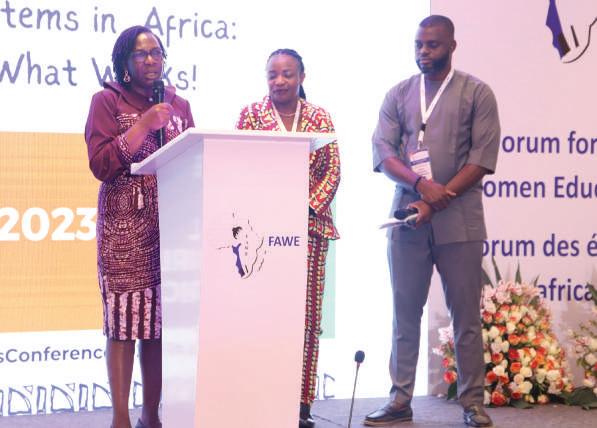
FAWE Executive Director Ms. Martha Muhwezi addresses the attendees of the conference. Looking on are FAWE Senior Advocacy and Partnerships Officer Ms. Catherine Asego and FAWE Togo National Chapter Coordinator Mr. Kossi Tsenou who were the moderators of the event.
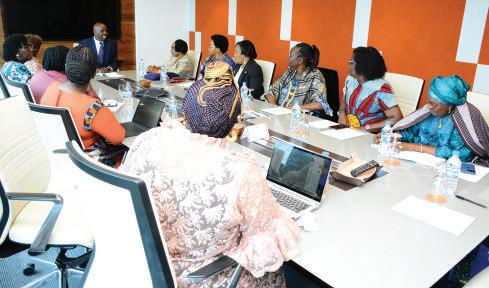
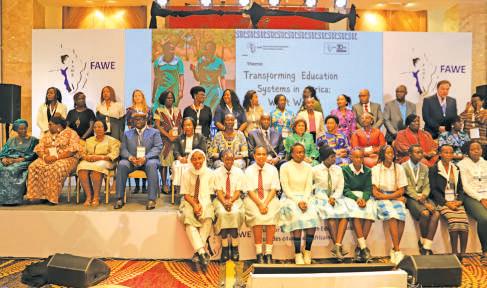
for Education
FAWE ANNUAL REPORT 2023 42
FAWE
Muhwezi
(right). Hon. Machogu was the guest of honor at the 3rd Triennial International FAWE Conference on Girls’ Education in Africa.
Kenyan Cabinet Secretary
Hon. Ezekiel Machogu (in blue suit) meets with fellow Ministers for Education in Africa from various countries and FAWE Board members before commencement of the conference.
A group photo session after the opening ceremony of the conference.
His
Highness
Madzimawe Madzathonya from Zambia (in blue shirt) together with his aids walk into the conference halls.

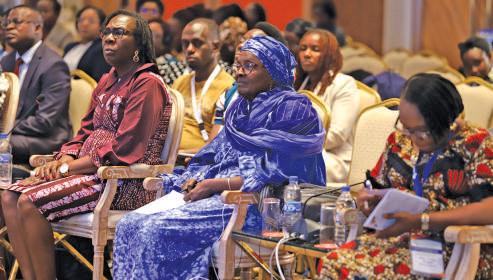
(Front row from right) Deputy Minister for Basic and Secondary Education in Sierra Leone Hon. Emily Gogra, FAWE Board Member Hon. Aïcha Bah Diallo (in blue) and FAWE Executive Director Ms. Martha Muhwezi (in purple) listen to a speaker at the conference
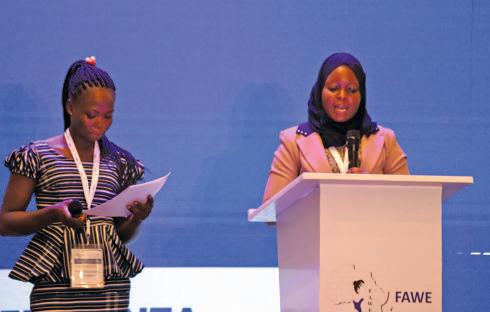

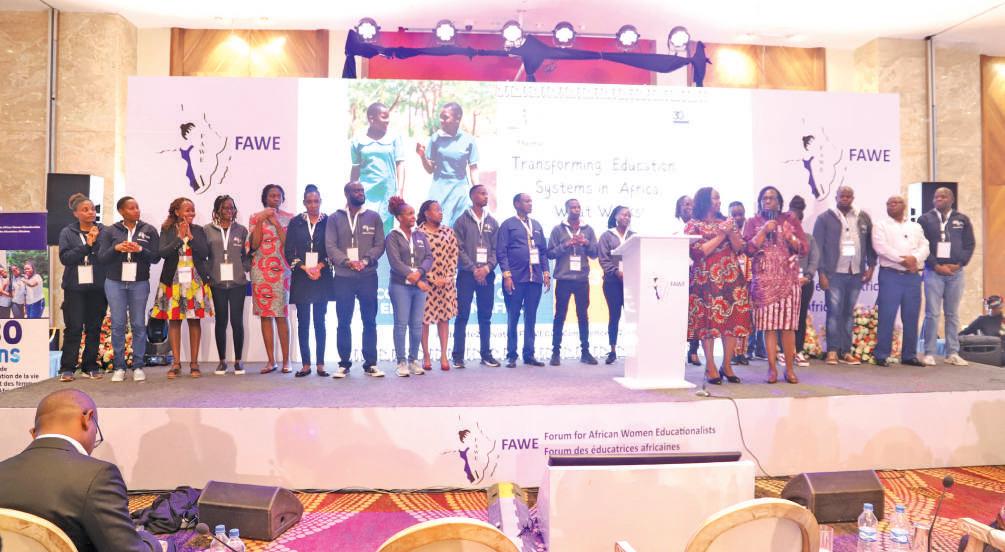
43 FAWE ANNUAL REPORT 2023
Dr. Koly Fall from Lartes leads a breakout session on Day 2 of the conference.
FAWE Alumni Ms. Dieng Anta (right) and Ms. Adasu Baniabori Fransisca read the communique on Day 2 of the conference.
FAWE Executive Director Ms. Martha Muhwezi introduces the FAWE RS team and expresses gratitude for the success of the conference.
Students of Embakasi Girls High School in Nairobi follow the conference proceedings on Day 1 of the FAWE Conference.
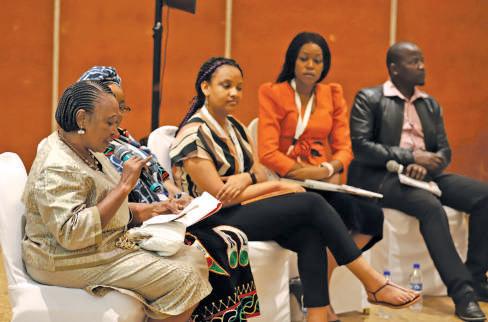
Deputy Minister for Basic and Secondary Education in Sierra Leone Hon. Emily Gogra speaks during a panel discussion held at a parallel session dubbed ‘Education: A Catalyst to Girls and Young Women Taking up Leadership Positions’. Looking on are fellow panelists Dr. Lanoi Parmuat, Executive Director, ENAI Africa, Lydia Madyirapanzi, Executive Director, FAWE Zimbabwe, Meti Gemechu from the Malala Fund and Michael Onguss from International IDEA.
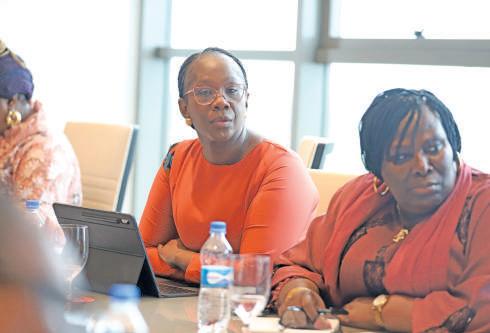
Her Royal Highness Queen Nozizwe KaMulela-Zulu, Managing Director, Eswatini Bank at a breakfast meeting alongside Ministers for Education from various countries in Africa and FAWE Board members before commencement of the conference.

(From left) Ms. Joyce Muchena, Gender Lead at the Mastercard Foundation, Mr. Eduard Buekman, Transformative Education Policy and Programme Lead at Oxfam Africa, Ms. Sabrina De Souza, Director National and Regional Advocacy at Malala Fund, Ms. Helen Crone, Education Specialist at UNICEF-ESARO and Ms. Dolores Dickson, Founder and Executive Director, Densu Associates.

Prof. Mary Okwakol, Executive Director National Council for Higher Education, Uganda and Chair, Forum for African Women Vice Chancellors delivers closing remarks at the conference.
FAWE ANNUAL REPORT 2023 44
FAWE Africa Selects New Board
By Emily Buyakii Communication Officer
The pinnacle of FAWE Africa’s governance structure, the General Assembly (GA), convened once again to chart the course for the organization’s future endeavors. On Thursday, 23rd November 2023, FAWE held its triennial 12th General Assembly in Nairobi, Kenya, marking a significant milestone in the organization’s journey.
The overarching objective of the GA was to deliberate on the synergies between the Continental Education Strategy for Africa (CESA) 16-25, the Sustainable Development
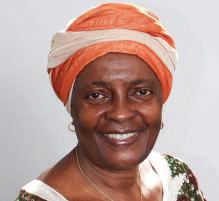
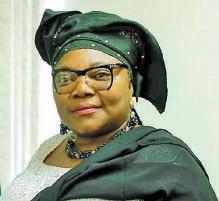
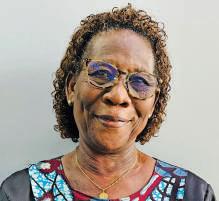

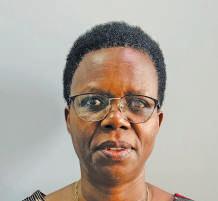
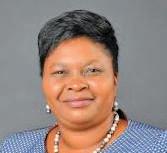
Goals (SDGs) 2030, and the African Union Agenda 2063. Emphasizing the importance of an integrated framework, discussions aimed to enhance coordination and efforts within FAWE’s network to advance gender equality in education across the continent. Moreover, the assembly delved into the multi-stakeholder approach necessary for the successful implementation of educational agendas in African countries.
Key to the GA’s proceedings was the election of the new FAWE Africa Board, tasked with providing overall policy guidance to the network. The following are the newly elected board members:
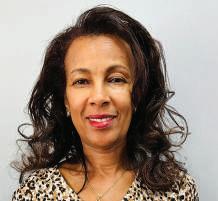
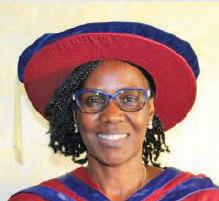
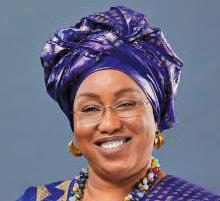

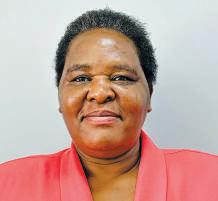
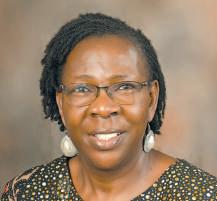
45 FAWE ANNUAL REPORT 2023
Chairperson: Hon. Aicha Bah Diallo
Member:Dr. Jeannine Agounke Kekeli
Member: Dr. Janviere Ndirahisha
Vice Chairperson: Prof. Sarah Anyang’ Agbor
Outgoing Board Chair Hon. Simone De Comarmond;
Member: Prof. Sunungurai Dominica Chingarande
Honorary Secretary: Dr. Emebet Mulugeta
Member: Ms. Oley Dibba Wadda
Member: Dr. Maggie Madimbo
Honorary Treasurer: Prof. Hazel Miseda Mumbo
Member: Prof. Josephine Ahikire
Executive Director and Secretary to the FAWE Board: Ms. Martha Muhwezi
The GA focused on critical areas of concern, including the assessment of past achievements, lessons learned, and challenges encountered during the previous Strategic Plan cycle. Moreover, the assembly exchanged views on resource mobilization strategies and enhancing stakeholder engagement to support girl child education initiatives.
During her tenure, outgoing Chairperson Hon. Simone de Comarmond reflected on FAWE’s achievements, including the revitalization of national chapters, staff expansion, financial stability, and the implementation of initiatives such as tax exemption and a new strategic plan. She also addressed challenges faced and underscored the importance of effective governance


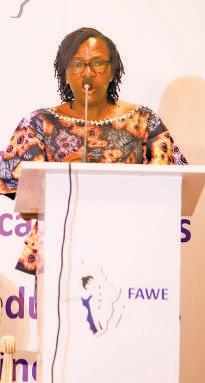
at the national level.
Noteworthy accomplishments highlighted in the assembly encompassed increased funding, the establishment of FAWE House, and investments in an endowment fund. Hon. Simone expressed gratitude to the outgoing board, management team, and members, urging continued dedication to FAWE’s mission of fostering gender equity in education.
The General Assembly served as a testament to FAWE’s unwavering commitment to promoting girls’ education and empowering women across Africa, setting a strong foundation for future endeavors in the pursuit of educational equity and excellence.
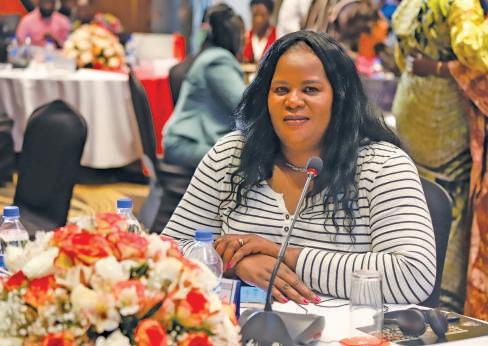
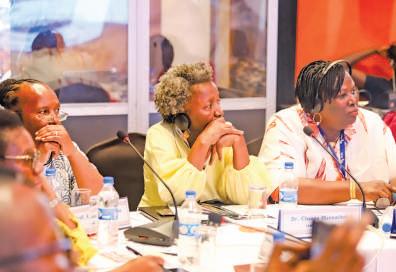
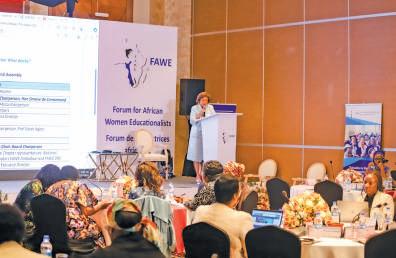
FAWE ANNUAL REPORT 2023 46
Members of FAWE Africa during the 12th General Assembly Meeting.
FAWE Deputy Executive Director Ms. Teresa Omondi-Adeitan addressing FAWE Members at the 12th General Assembly Meeting.
FAWE Executive Director Ms. Martha Muhwezi delivers a speech at the 12th General Assembly Meeting.
Members of FAWE Africa during the 12th General Assembly Meeting.
FAWE Africa Board Chairperson Hon. Simone De Comarmond addressing FAWE Members at the 12th General Assembly held in Nairobi, Kenya.
Dr. Chikondi Mpokosa, FAWE Africa Board Member.
FAWE’s 30th Anniversary Celebration: A Reflection of Impact and Vision
By Emily Buyakii Communication Officer
FAWE proudly commemorated its 30th anniversary during a glamourous dinner event held on the evening of 22nd November 2023 in Nairobi, Kenya. The celebration was a testament to three decades of unwavering commitment to achieving gender parity in African education.
Since its inception in June 1993, FAWE has championed education as a catalyst for change, particularly for African girls and women. With a presence in over 32 countries across the continent, the organization has emerged as a beacon of hope, dedicated not only to providing access to education but also to empowering girls towards self-reliance and productivity.
The 30th anniversary celebration provided an opportunity for FAWE to reflect on the journey of girls’ education in Africa, acknowledging successes, identifying challenges, and disseminating invaluable lessons learned. It served as a poignant reminder of the ongoing imperative to prioritize girls’ education across the continent.
The celebration aimed to achieve several key objectives:
I. Documenting FAWE’s Legacy: The event highlighted FAWE’s 30 years of experience and influence on the education system in Africa, underscoring its pivotal role in shaping policies and initiatives to advance girls’ education.
II. Honoring Contributions: The anniversary celebration provided an occasion to recognize and appreciate individuals and organizations that have made significant contributions to FAWE’s success and milestones achieved over the years.
III. Increasing Visibility and Sharing Future Plans: The event served as a platform to enhance FAWE’s visibility by sharing important information about current interventions and unveiling FAWE’s strategy beyond 2023, encapsulated in the Strategic Plan 2024 – 2028.
During the celebratory dinner, attendees were treated to a documentary showcasing FAWE’s transformative journey over the past three decades. Additionally, several individuals were honored for their outstanding contributions to FAWE and girls’ education in Africa:
1
. The Hon. Vida Yeboah National Chapter Award: Presented to FAWE Zambia in recognition of its exemplary contributions.
2
. Upcoming National Chapter Award: Acknowledging the promising initiatives of FAWE Nigeria.
3
. Long-Serving National Chapter Coordinators: Ms. Winifred Deline (FAWE Liberia), Ms. Roman Degefa (FAWE Ethiopia), and Ms. Neema Kitundu (FAWE Tanzania) were lauded for their dedication and commitment.
4
. The Hawa Semega Alumni Award: Presented to Cheka Omari from Tanzania in honor of her outstanding alumni achievements.
5
. Essay Writing Competition Runners-Up and Winner: Umel Awountsa from Cameroon and Sarah Sokolabe from Nigeria were recognized as the 2nd and 1st runners-up, respectively, with Abit Riassai Aicha from Cameroon emerging as the winner.
FAWE’s 30th anniversary celebration was a testament to its enduring commitment to transformative education and a rallying cry for continued efforts to ensure equitable access to quality education for girls across
Africa. As FAWE looks to the future, its vision remains steadfast: to create inclusive, gender-responsive education systems that empower every African girl to thrive.
47 FAWE ANNUAL REPORT 2023
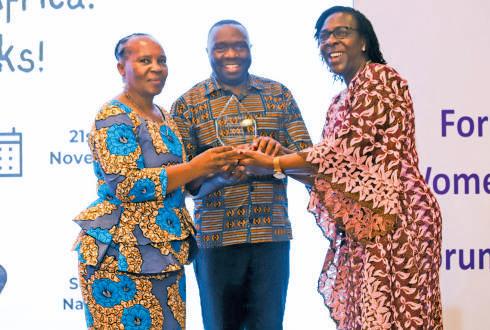
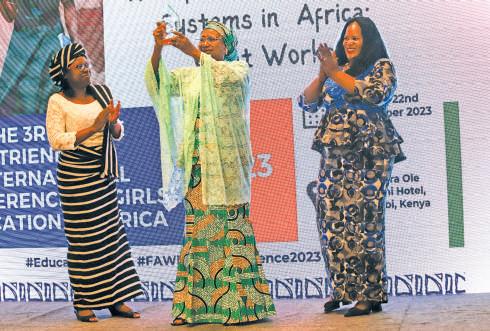
Dr. Jiddere Kaibo, FAWE Nigeria Board Chairperson proudly lifts a plaque awarded to FAWE Nigeria during the FAWE 30year anniversary. Looking on are FAWE Africa Board Member Dr. Chikondi Mpokosa (right) and Ms. Epua Ewa, Executive Director for FAWE Nigeria.
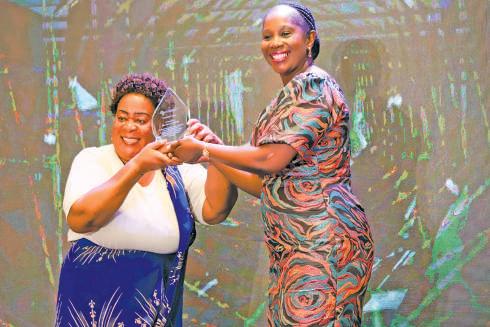
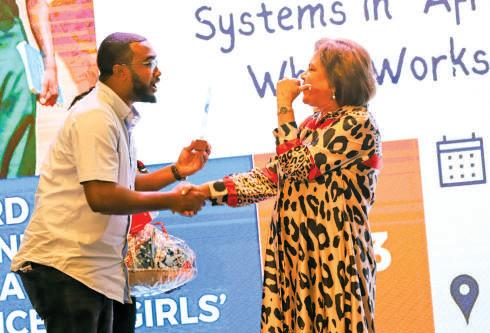
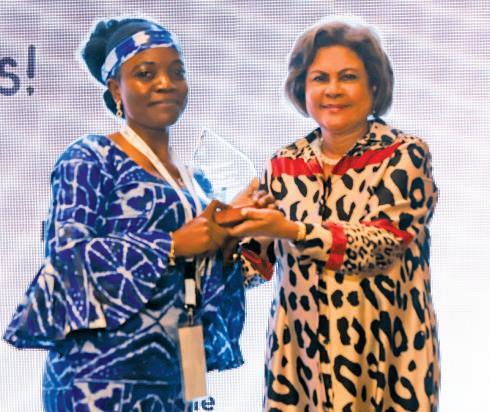
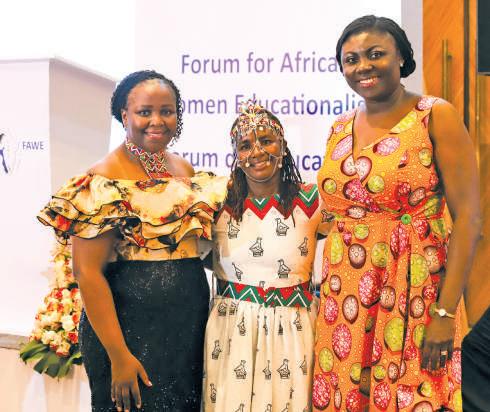
FAWE ANNUAL REPORT 2023 48
FAWE Alumni from Kenya Mr. Ahmed Maalim Adow (left) shares a light moment on stage with FAWE Africa Board Chairperson Hon. Simone De Comarmond.
FAWE Executive Director Ms. Teresa Omondi-Adeitan, FAWE Member Eng. Joy Makumbe and FAWE Member Ama Serwa Serquaye-Tetteh having a photo moment at the FAWE anniversary dinner event.
Her Majesty Queen Nozizwe KaMulela-Zulu, Queen of the Zulu Kingdom (right) hands over a plaque to Ms. Neema Kitundu, Executive Director of FAWE Tanzania for her long service to FAWE.
FAWE Africa Board Chairperson Hon. Simone De Comarmond (right) awards Essay Competition winner Ms. Abit Riassai from Cameroon.
FAWE Executive Director Ms. Martha Muhwezi hands over a plaque to FAWE Zambia Executive Director Mr. Costern Kanchele (middle) and FAWE Zambia Board Chairperson Prof. Enala Tembo Mwase (left).
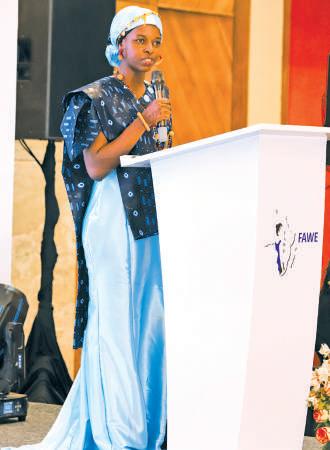
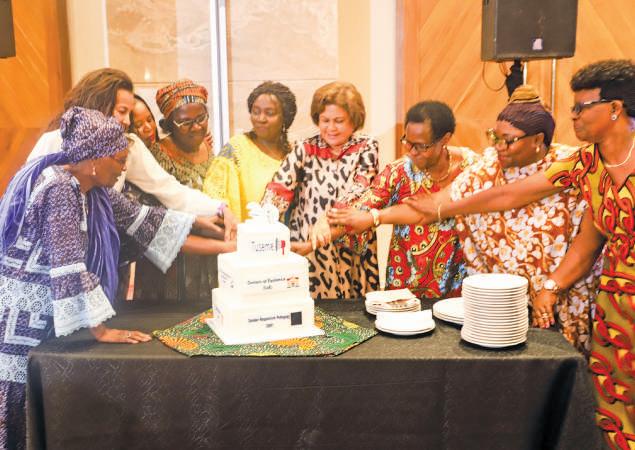
49 FAWE ANNUAL REPORT 2023
FAWE alumnus from Senegal Ms. Adama Diallo gives the vote of thanks.
Members of the FAWE Board cut a celebratory cake at the 30th Anniversary of the organization.
FAWE ANNUAL REPORT 2023 50
51 FAWE ANNUAL REPORT 2023 Promoting Youth Employment through modularised Technical 51
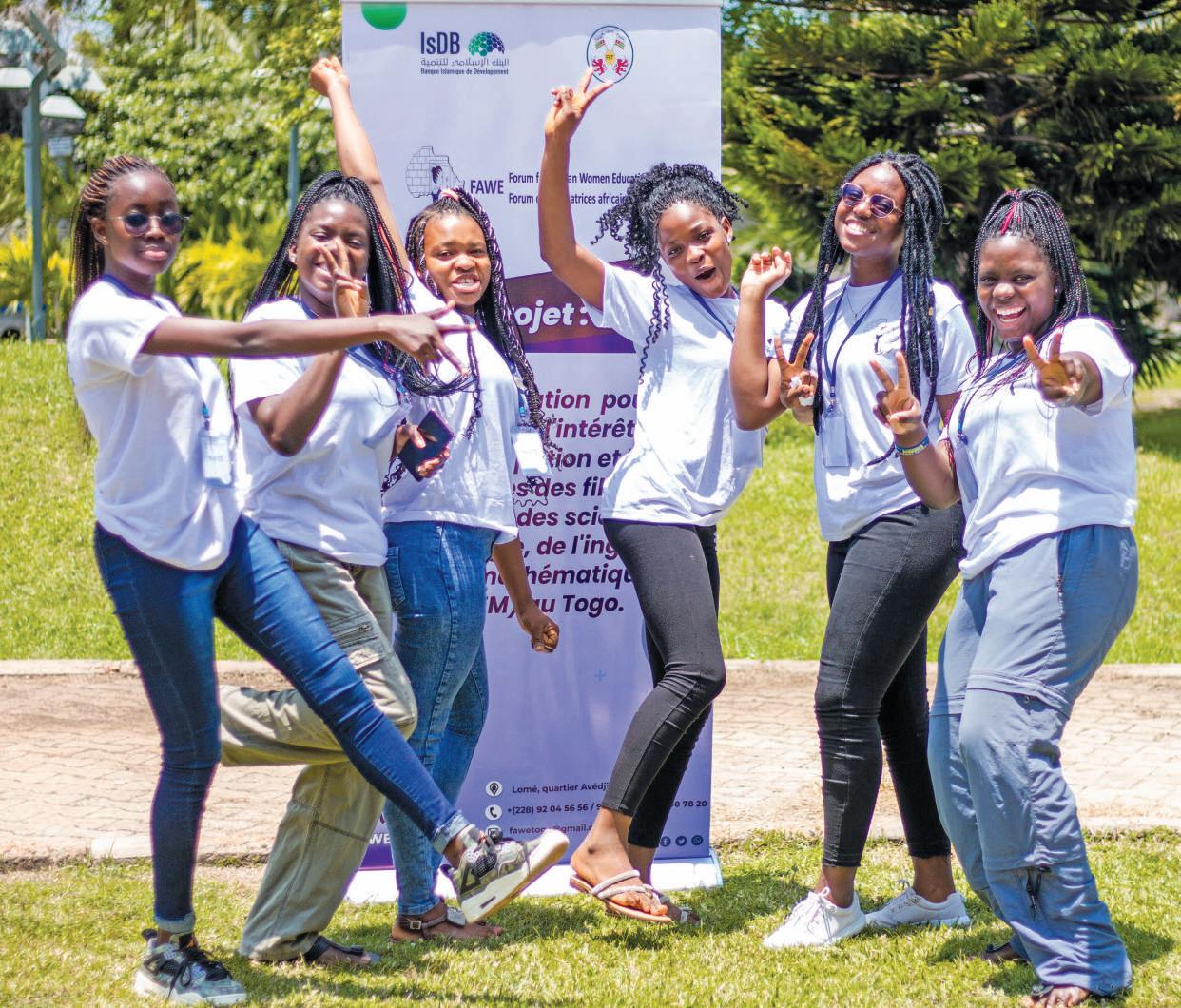
F A W E FAWE Forum for African Women Educationalists Forum des éducatrices africaines FAWE Regional Secretariat FAWE House Chania Avenue, Off Wood Avenue Kilimani, PO Box 21394-00505, Ngong Road, Nairobi, Kenya. +254 709 436 000/+254 714 606 629/+254 736 387 000 fawe@fawe.org Forum for African Women Educationists @RsFawe FAWE Africa FAWE Fawe_regional


























































































